Search Result
Results for "
checkpoint inhibitor
" in MedChemExpress (MCE) Product Catalog:
| Cat. No. |
Product Name |
Target |
Research Areas |
Chemical Structure |
-
- HY-P99032
-
|
IPH2201
|
Checkpoint Kinase (Chk)
IFNAR
|
Inflammation/Immunology
Cancer
|
|
Monalizumab (IPH2201) is an immune checkpoint inhibitor targeting Natural Killer Group 2A (NKG2A). Monalizumab, a humanized anti-NKG2A blocking mAb, increases IFN-γ production, thereby promoting NK cell effector functions. Monalizumab can be used for the research of head and neck squamous cell carcinoma (HNSCC) .
|
-

-
- HY-13946
-
-
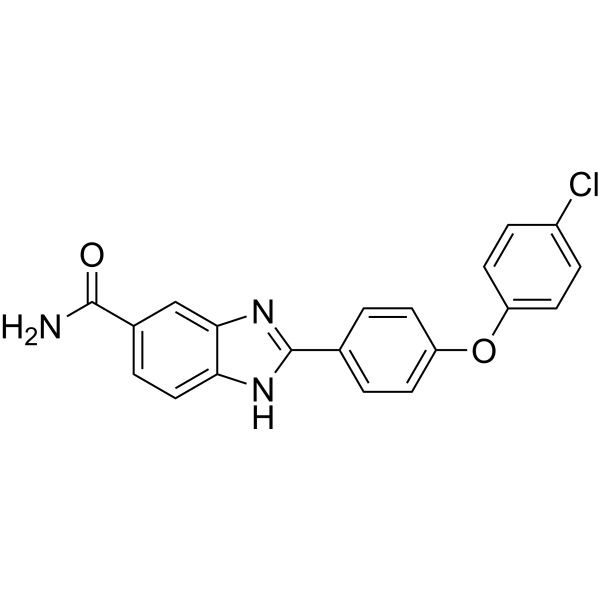
-
- HY-N12840
-
|
|
Others
|
Metabolic Disease
|
|
Logmalicid B is an iridoid glycoside compound that can be isolated from Cornus officinalis and can be used in diabetes research .
|
-

-
- HY-138073
-
|
|
Others
|
Cancer
|
|
Cryptomoscatone D2 is a potent G2 checkpoint inhibitor .
|
-
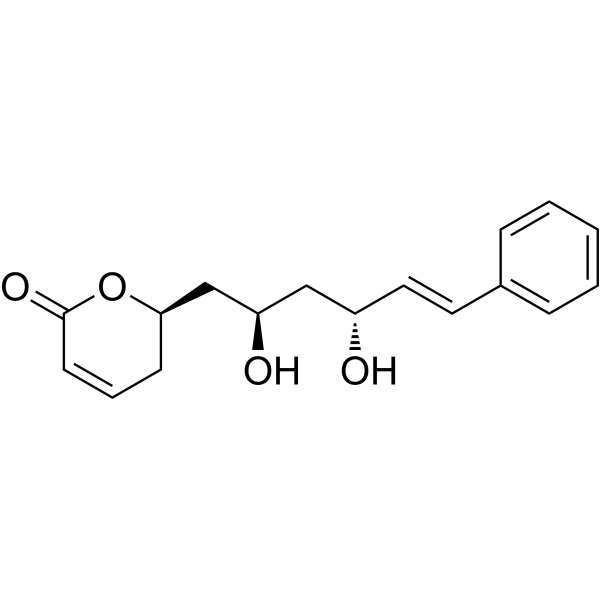
-
- HY-111369
-
-
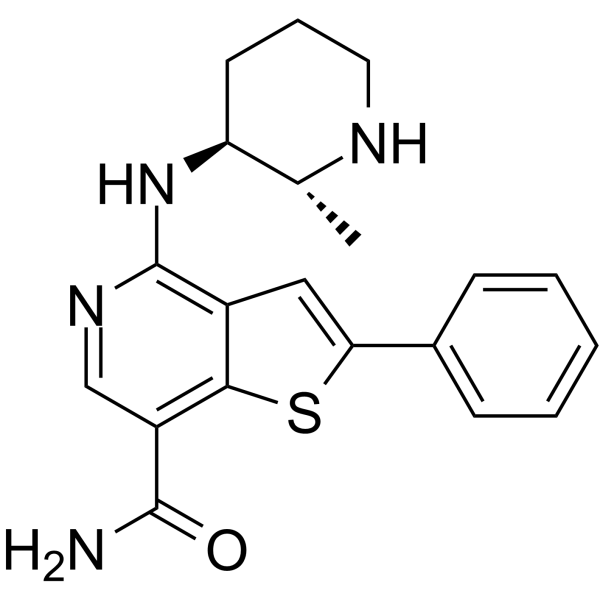
-
- HY-132884
-
|
|
Others
|
Cancer
|
|
TTK inhibitor 3 is a potent and selective TTK (an essential spindle assembly checkpoint enzyme) inhibitor with an IC50 value of 3.0 nM.
|
-
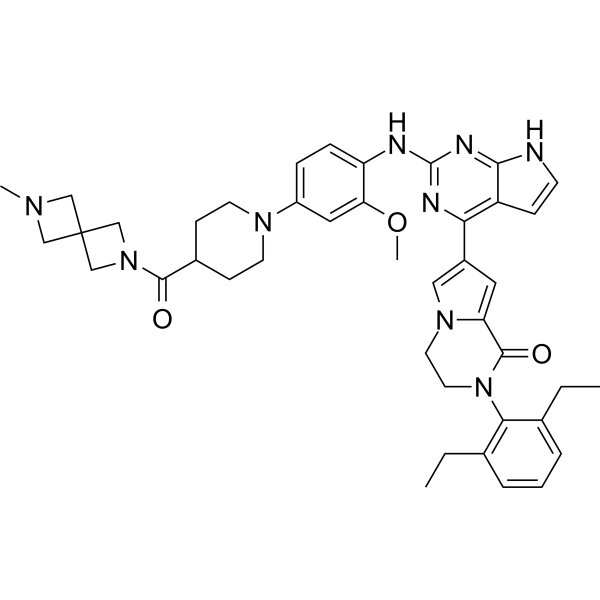
-
- HY-10992
-
AZD-7762
Maximum Cited Publications
20 Publications Verification
|
Checkpoint Kinase (Chk)
|
Cancer
|
|
AZD-7762 is a potent ATP-competitive checkpoint kinase (Chk) inhibitor in with an IC50 of 5 nM for Chk1.
|
-
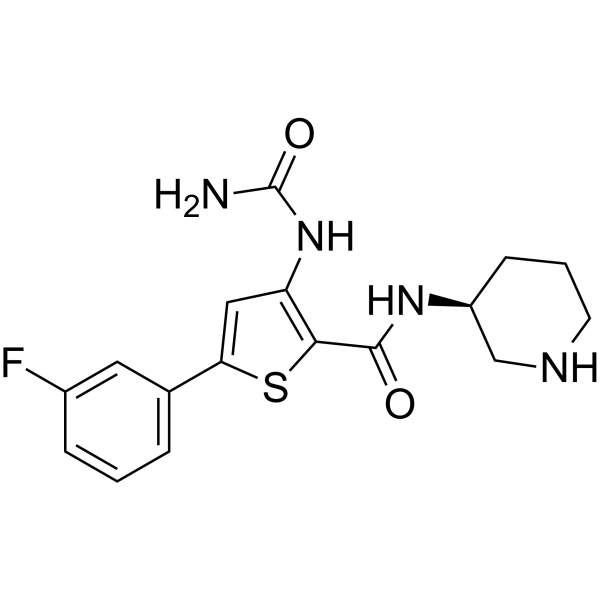
-
- HY-10992A
-
|
|
Checkpoint Kinase (Chk)
|
Cancer
|
|
AZD-7762 hydrochloride is a potent ATP-competitive checkpoint kinase (Chk) inhibitor in with an IC50 of 5 nM for Chk1.
|
-
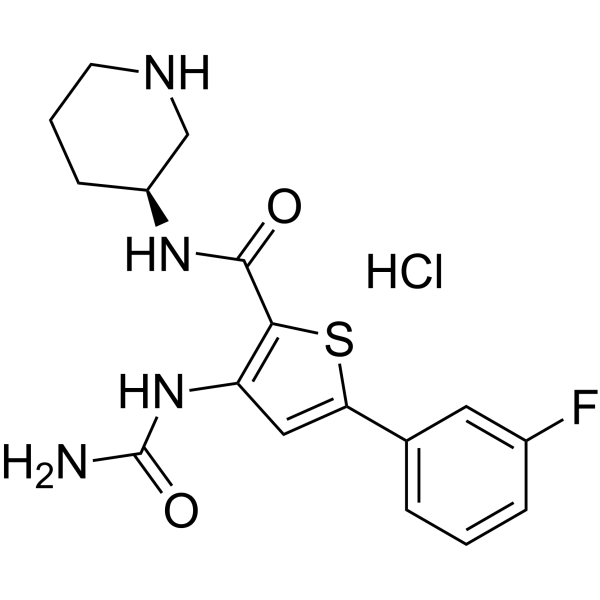
-
- HY-128601
-
-
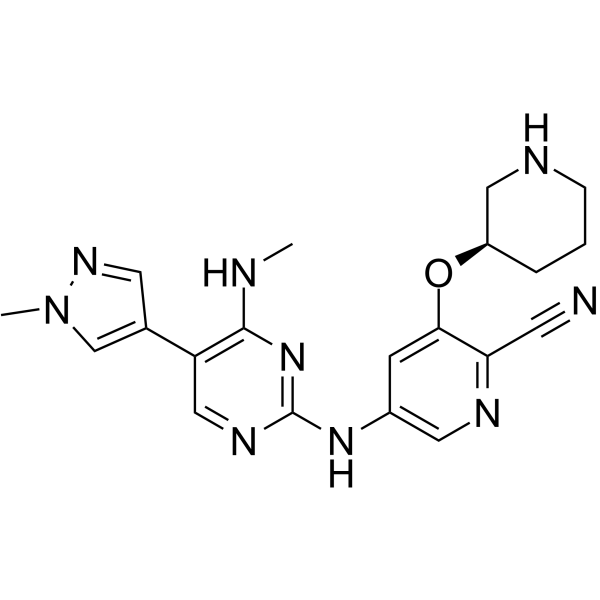
-
- HY-108343
-
|
|
Wee1
|
Cancer
|
|
WEE1-IN-4 is a potent checkpoint Wee1 kinase inhibitor with an IC50 of 0.011 μM .
|
-
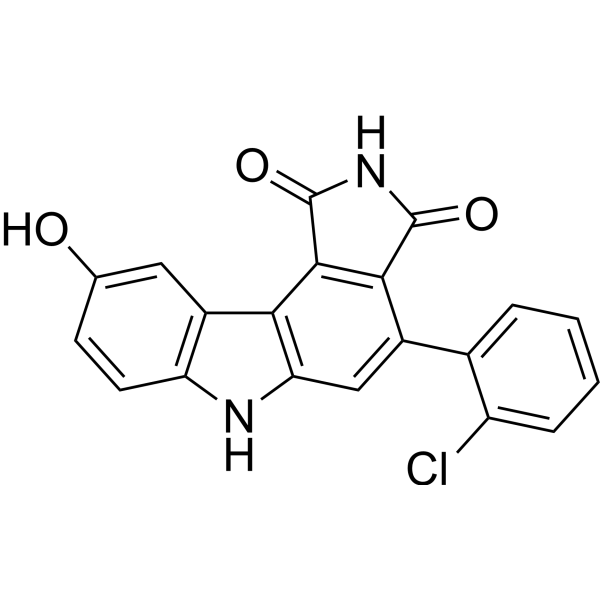
-
- HY-18942
-
|
|
Checkpoint Kinase (Chk)
|
Cancer
|
|
VER-00158411 is a checkpoint kinase 1 (CHK1) and CHK2 inhibitor with IC50 values of 4.4 nM and 4.5 nM, respectively .
|
-
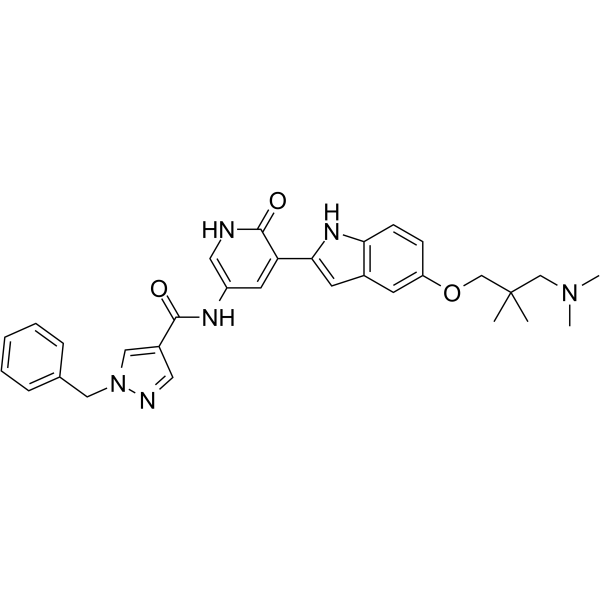
-
- HY-15532B
-
|
MK-8776 S-isomer
|
Others
|
Cancer
|
|
SCH900776 S-isomer is the S-isomer of SCH900776. SCH900776 is a potent, selective and orally bioavailable inhibitor of checkpoint kinase1 (Chk1) with IC50 of 3 nM.
|
-
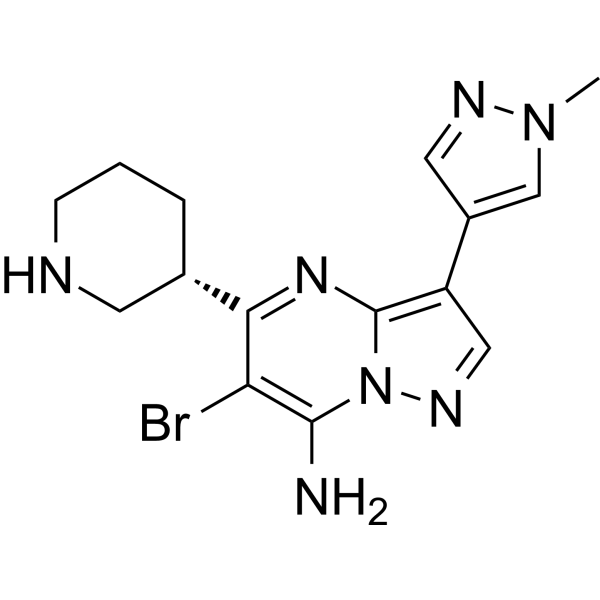
-
- HY-18175
-
|
|
Checkpoint Kinase (Chk)
|
Cancer
|
|
CCT244747 is a potent, orally bioavailable and highly selective CHK1 inhibitor, with an IC50 of 7.7 nM; CCT244747 also abrogates G2 checkpoint with an IC50 of 29 nM.
|
-
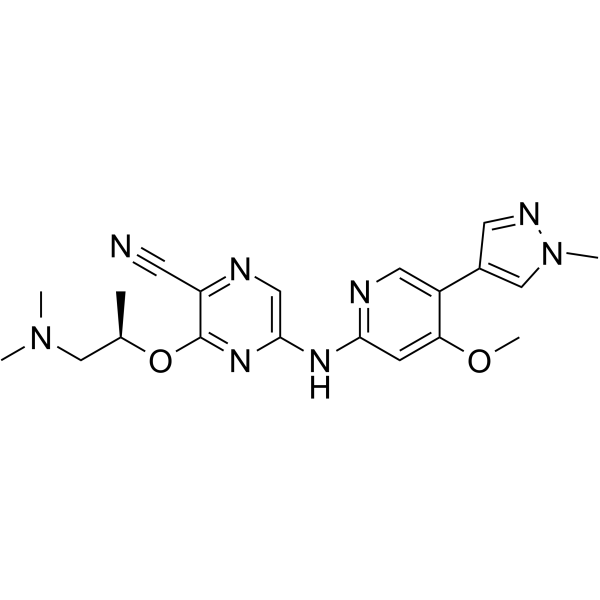
-
- HY-103366
-
|
|
Checkpoint Kinase (Chk)
|
Cancer
|
|
NSC 109555 ditosylate is a potent, selective, ATP-competitive checkpoint kinase 2 (Chk2) inhibitor with an IC50 of 240 nM. NSC 109555 ditosylate can be used for the research of cancer .
|
-
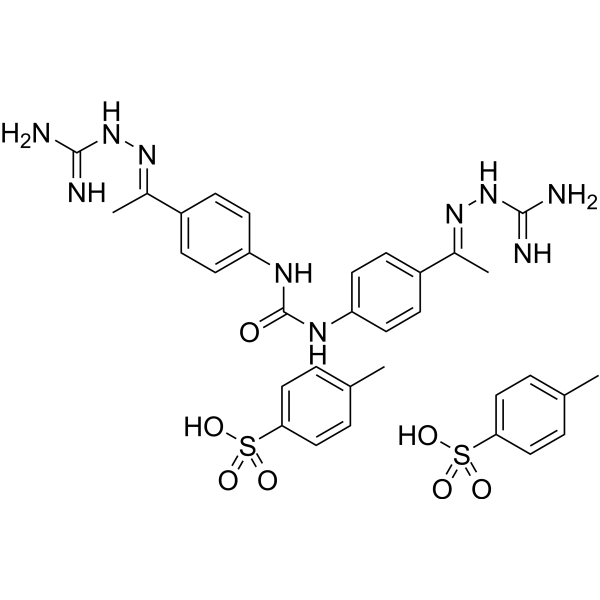
-
- HY-131446
-
|
|
Checkpoint Kinase (Chk)
|
Cancer
|
|
Chk1-IN-5 is a potent checkpoint kinase 1 (Chk1) inhibitor. Chk1-IN-5 inhibits Chk1 phosphorylation and inhibits tumor growth in colon cancer xenograft model .
|
-
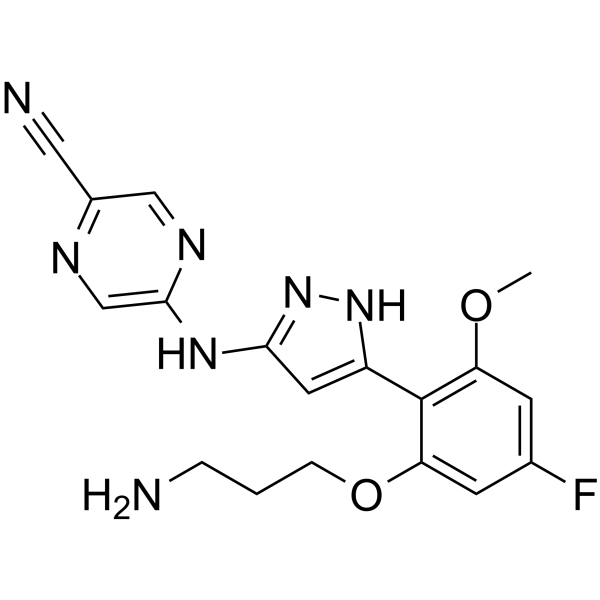
-
- HY-102011
-
|
|
PD-1/PD-L1
|
Inflammation/Immunology
Cancer
|
|
BMS-1166 is a potent PD-1/PD-L1 immune checkpoint inhibitor. BMS-1166 induces dimerization of PD-L1 and blocks its interaction with PD-1, with an IC50 of 1.4 nM. BMS-1166 antagonizes the inhibitory effect of PD-1/PD-L1 immune checkpoint on T cell activation .
|
-
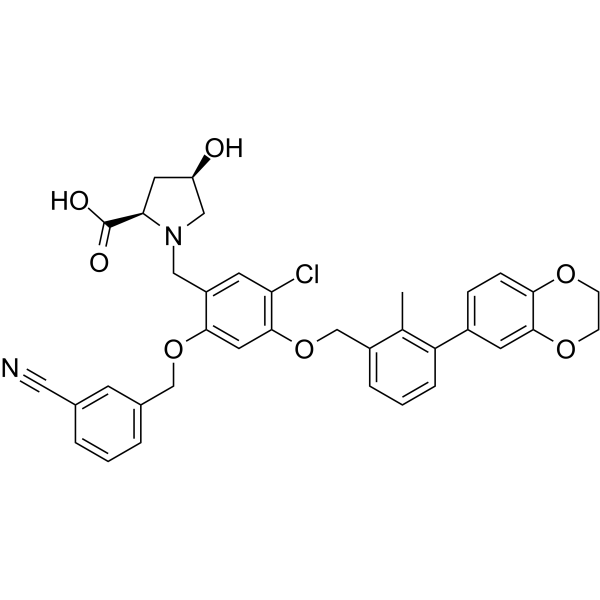
-
- HY-102011A
-
|
|
PD-1/PD-L1
|
Inflammation/Immunology
Cancer
|
|
BMS-1166 hydrochloride is a potent PD-1/PD-L1 immune checkpoint inhibitor. BMS-1166 hydrochloride induces dimerization of PD-L1 and blocks its interaction with PD-1, with an IC50 of 1.4 nM. BMS-1166 hydrochloride antagonizes the inhibitory effect of PD-1/PD-L1 immune checkpoint on T cell activation .
|
-
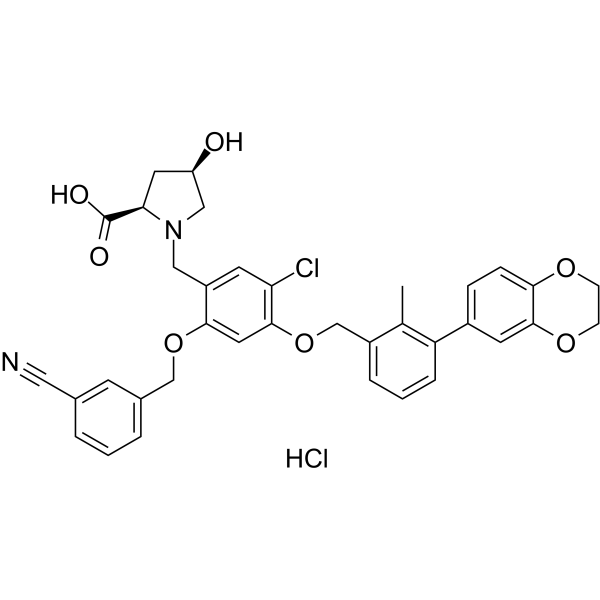
-
- HY-100341
-
|
|
Others
|
Others
|
|
M2I-1 is a Mad2 inhibitor targeting the binding of Mad2 to Cdc20, an essential protein-protein interaction (PPI) within the spindle assembly checkpoint (SAC) .
|
-
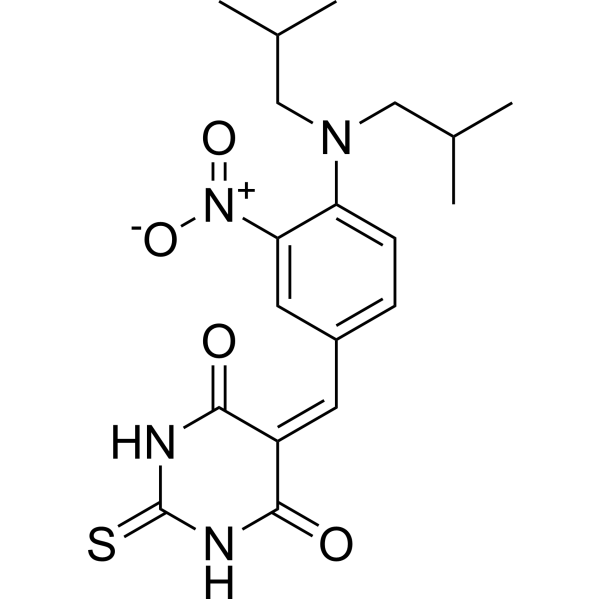
-
- HY-100016
-
|
|
ATM/ATR
Apoptosis
|
Cancer
|
|
AZD0156 is a potent, selective and orally active ATM inhibitor with an IC50 of 0.58 nM. AZD0156 inhibits the ATM-mediated signaling, prevents DNA damage checkpoint activation, disrupts DNA damage repair, and induces tumor cell apoptosis .
|
-
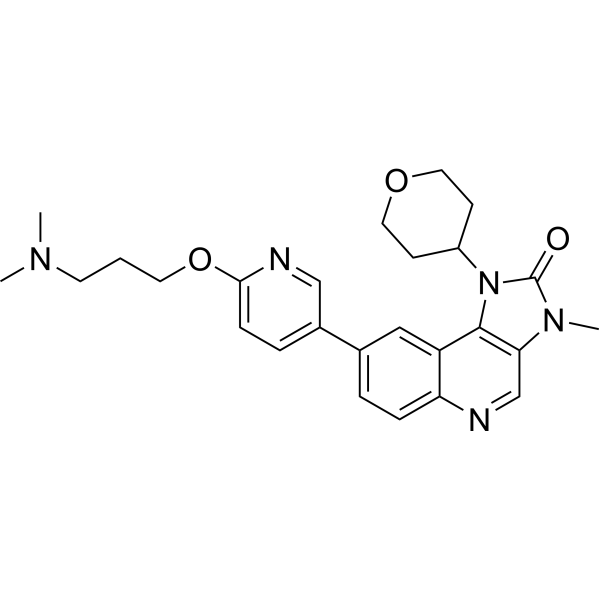
-
- HY-128766
-
|
|
Checkpoint Kinase (Chk)
|
Cancer
|
|
CHK1-IN-4 (Compound 3) is a potent checkpoint kinase 1 (chk1) inhibitor, and potently inhibits chk1 phosphorylation in the tumor cells. CHK1-IN-4 has anti-tumor activity .
|
-
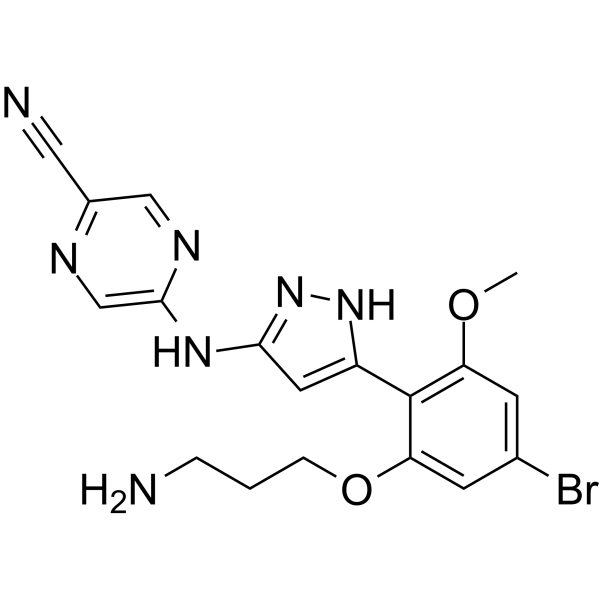
-
- HY-P99895
-
|
|
PD-1/PD-L1
|
Inflammation/Immunology
Cancer
|
|
Rulonilimab is a human IgG1 monoclonal antibody against PD-1 that targets, binds and inhibits PD-1 and its downstream signalling pathways with potential immune checkpoint inhibition and anti-tumour activity .
|
-

-
- HY-150879
-
-
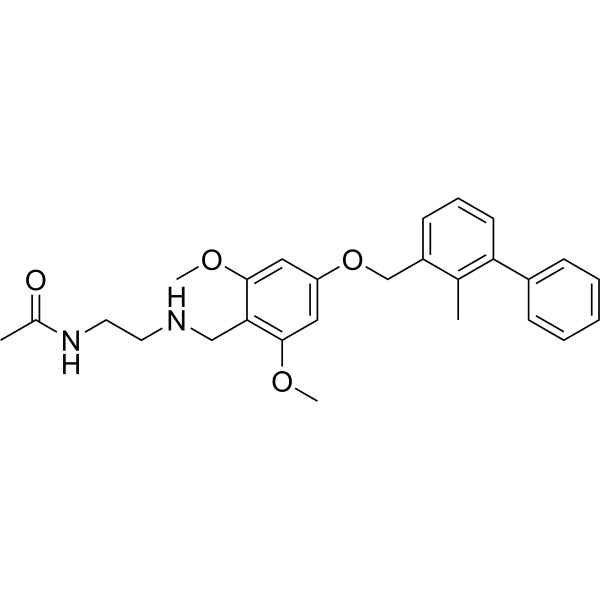
-
- HY-136270
-
|
VX-803; M4344; ATR inhibitor 2
|
ATM/ATR
|
Cancer
|
|
Gartisertib (VX-803) is an ATP-competitive, orally active, and selective ATR inhibitor, with a Ki of <150 pM. Gartisertib potently inhibits ATR-driven phosphorylated checkpoint kinase-1 (Chk1) phosphorylation with an IC50 of 8 nM. Antitumor activity .
|
-
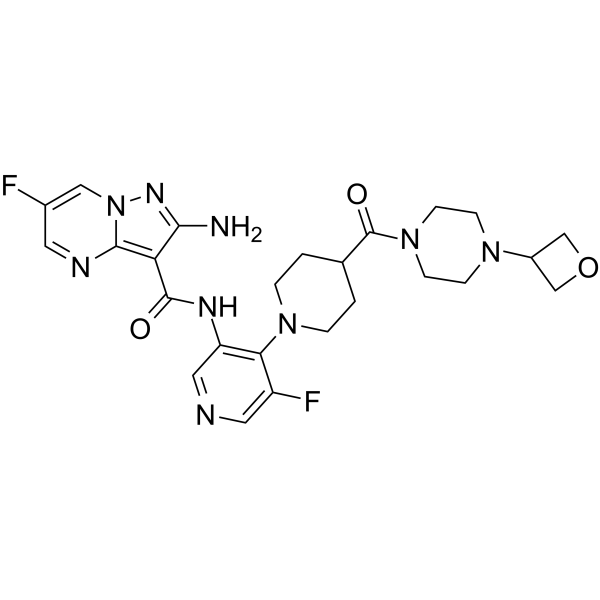
-
- HY-153450
-
|
|
Protein Arginine Deiminase
|
Cancer
|
|
JBI-589 is a non-covalent PAD4 isoform-selective inhibitor. JBI-589 reduces CXCR2 expression and blocks neutrophil chemotaxis. JBI-589 reduces primary tumor and metastases, and enhances the anti-tumor effect of checkpoint inhibitors .
|
-
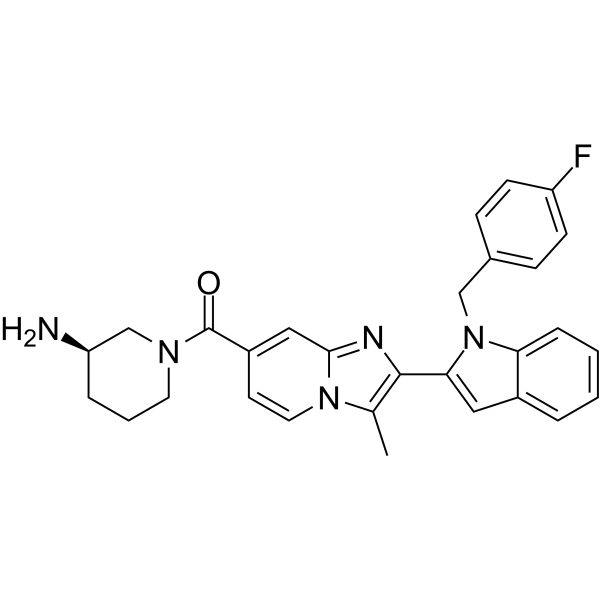
-
- HY-153435
-
|
|
RIP kinase
Necroptosis
|
Cancer
|
|
RIP1 kinase inhibitor 5 (example 1) is a potent inhibitor of RIP1, which is used as a checkpoint kinase to control tumor immunity . RIP1 kinase inhibitor 5 is similar with SIR1-365 (compound 13), which inhibits necrosis and iron death activity .
|
-
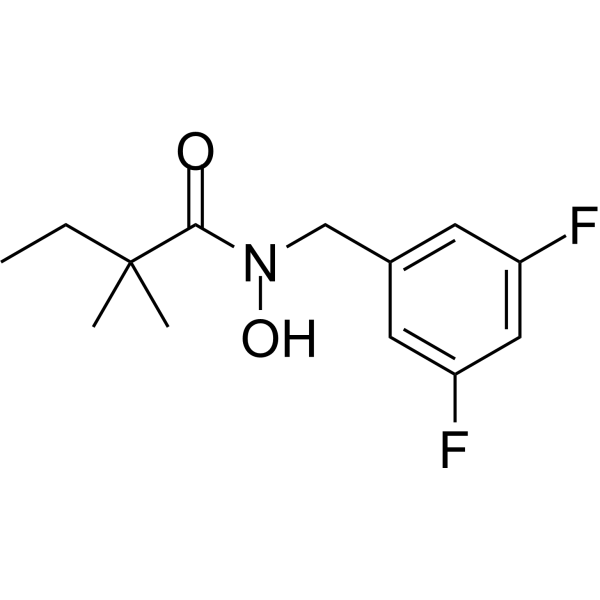
-
- HY-18961
-
-
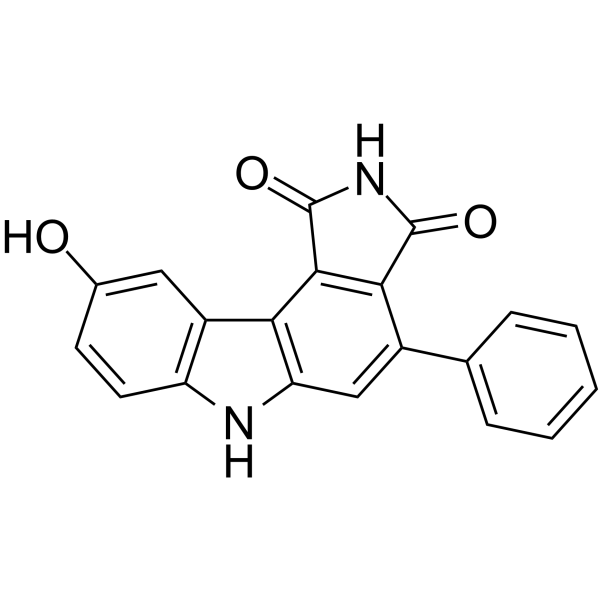
-
- HY-149874
-
|
|
DGK
|
Inflammation/Immunology
|
|
BMS-502 (Compound 22) is a potent dual inhibitor of diacylglycerol kinase (DGK) α and ζ with IC50 of 4.6 nM and 2.1 nM. BMS-502 enhanced T cell immune responses in mice. BMS-502 can be used in tumor immunity related research .
|
-
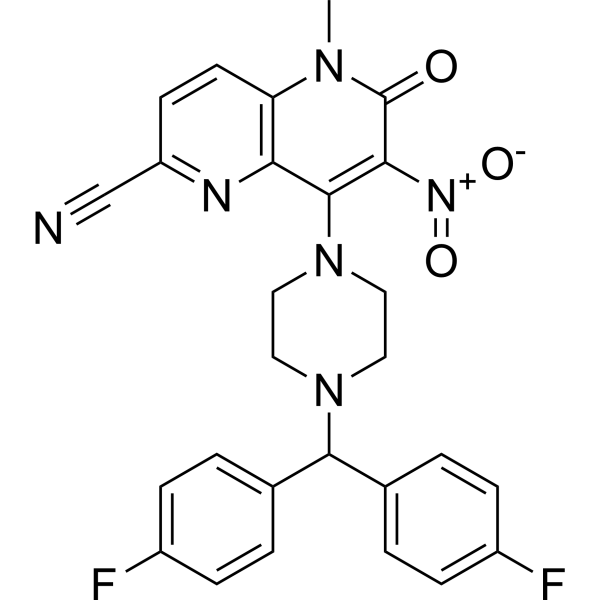
-
- HY-N12041
-
|
|
TAM Receptor
HIF/HIF Prolyl-Hydroxylase
|
Cancer
|
|
Axl-IN-16 is a dual inhibitor of Axl/HIF. Axl-IN-16 induces fruiting body formation of Flammulina velutipes. Axl-IN-16 inhibits hypoxia-inducible factor activity and receptor tyrosine kinase expression .
|
-
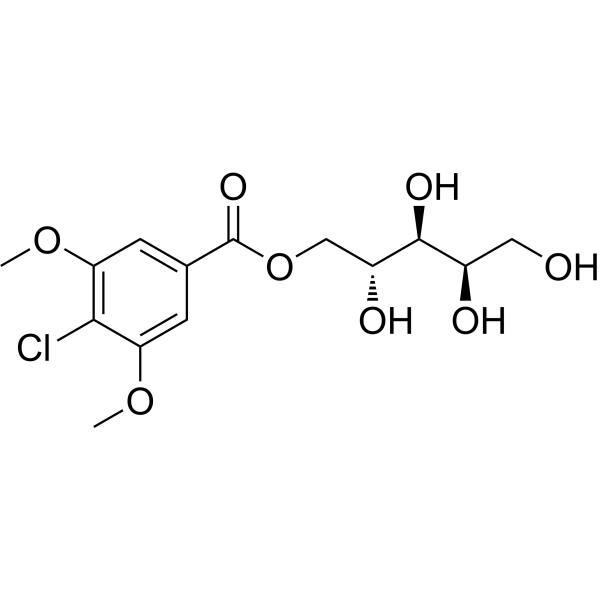
-
- HY-136220A
-
|
|
Aryl Hydrocarbon Receptor
|
Cancer
|
|
AHR antagonist 5 hemimaleate, a potent and orally active aryl hydrocarbon receptor (AHR) antagonist, has an IC50 of < 0.5 µΜ. AHR antagonist 5 hemimaleate significantly inhibits tumor growth combined with checkpoint inhibitor anti-PD-1 (WO2018195397, example 39) .
|
-
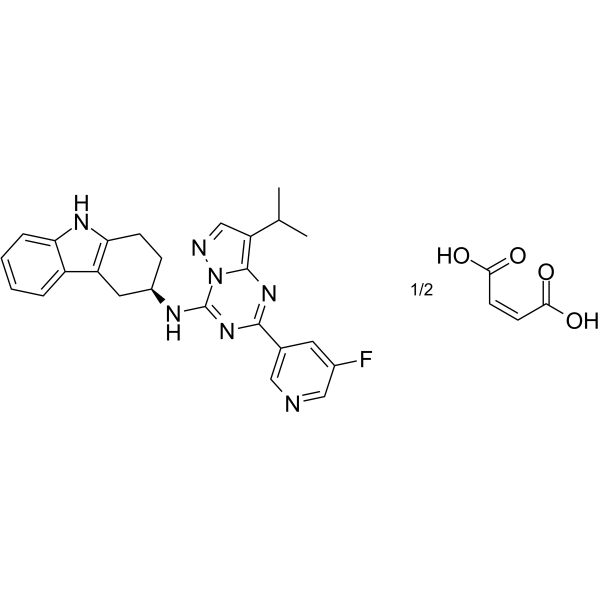
-
- HY-15532
-
|
MK-8776
|
Checkpoint Kinase (Chk)
|
Cancer
|
|
SCH900776 (MK-8776) is a potent, selective and orally bioavailable inhibitor of checkpoint kinase1 (Chk1) with an IC50 of 3 nM. SCH900776 shows 50- and 500-fold selectivity over CDK2 and Chk2, respectively .
|
-
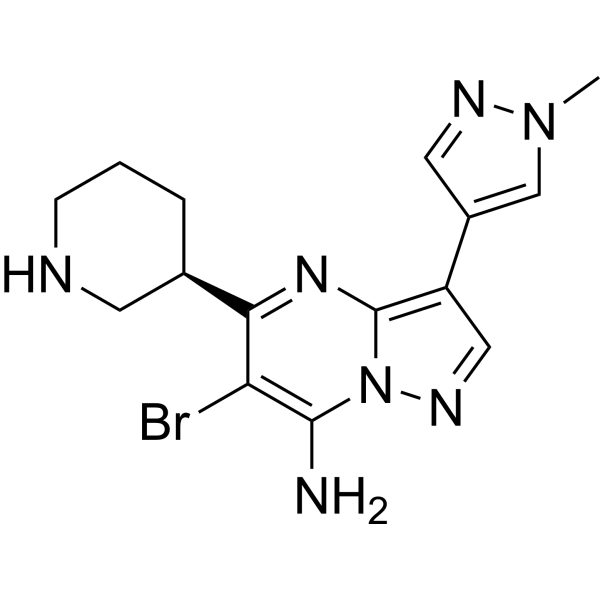
-
- HY-P99166
-
|
|
PD-1/PD-L1
CTLA-4
|
Inflammation/Immunology
|
|
Vudalimab is a potent dual PD-1 and CTLA-4 inhibitor as a fully humanized bispecific monoclonal antibody. Vudalimab targets immune checkpoint receptors PD-1 and CTLA-4 and promotes tumor-selective T-cell activation .
|
-

-
- HY-136220
-
|
|
Aryl Hydrocarbon Receptor
|
Cancer
|
|
AHR antagonist 5, a potent and orally active aryl hydrocarbon receptor (AHR) antagonist extracted from patent WO2018195397, example 39, has an IC50 of < 0.5 µΜ. AHR antagonist 5 significantly inhibits tumor growth combined with checkpoint inhibitor anti-PD-1 .
|
-
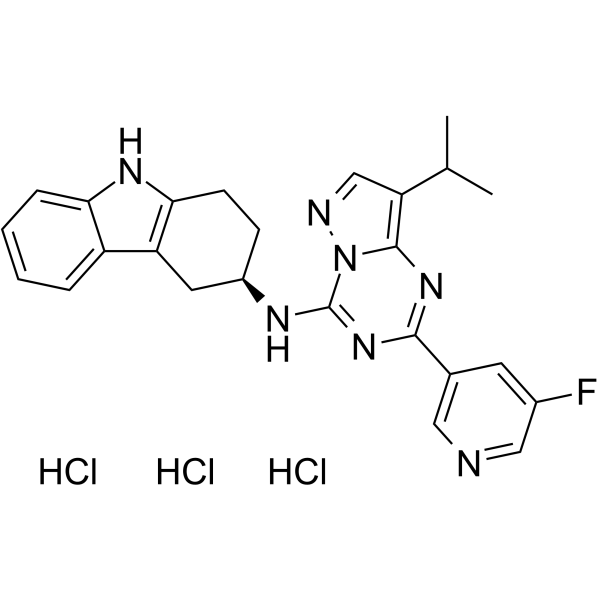
-
- HY-112162
-
|
|
Mps1
|
Cancer
|
|
BOS-172722 is an inhibitor of monopolar spindle 1 (MPS1) checkpoint with an IC50 of 11 nM and 63 nM for MPS1 (1 mM ATP) and P-MPS1, respectively. BOS-172722 also has potential for the study of various forms of breast cancer .
|
-
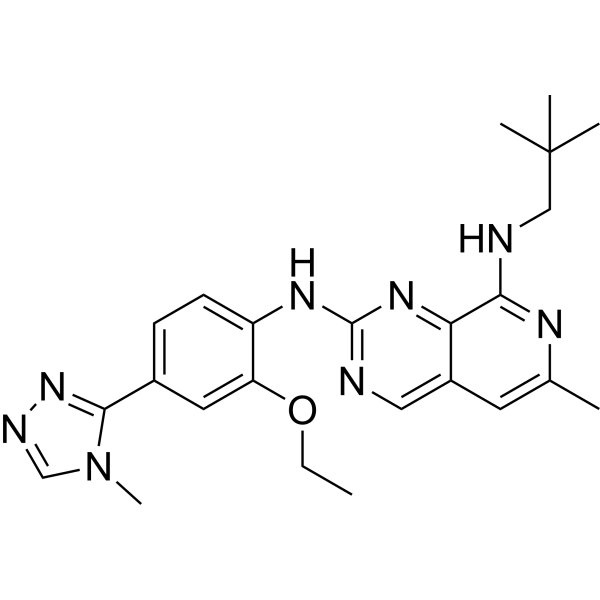
-
- HY-100591
-
|
|
Sirtuin
|
Neurological Disease
Inflammation/Immunology
Cancer
|
|
SirReal2 is a potent, isotype-selective Sirt2 inhibitor with an IC50 value of 140 nM and has very little effect on the activities of Sirt3-5. SirReal2 leads to tubulin hyperacetylation in HeLa cells and induces destabilization of the checkpoint protein BubR1 .
|
-
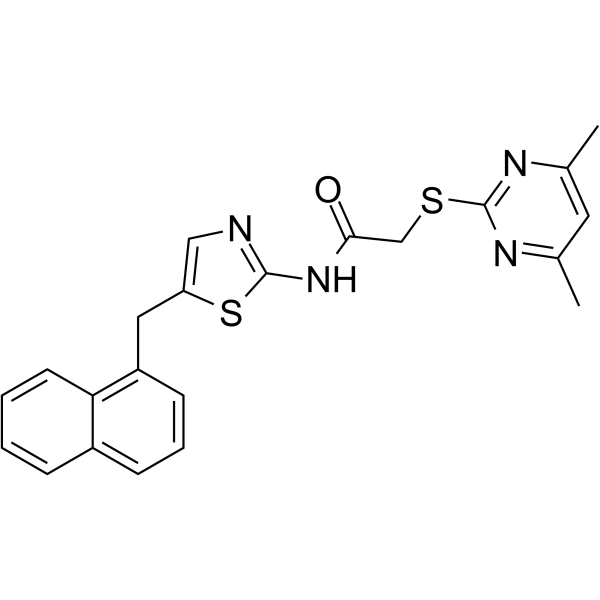
-
- HY-13649
-
|
ZIO 301; D 24851
|
Microtubule/Tubulin
Apoptosis
|
Neurological Disease
Cancer
|
|
Indibulin (ZIO 301), an orally applicable inhibitor of tubulin assembly, shows potent anticancer activity with a minimal neurotoxicity. Indibulin reduces inter-kinetochoric tension, produces aberrant spindles, activates mitotic checkpoint proteins Mad2 and BubR1, and induces mitotic arrest and apoptosis .
|
-
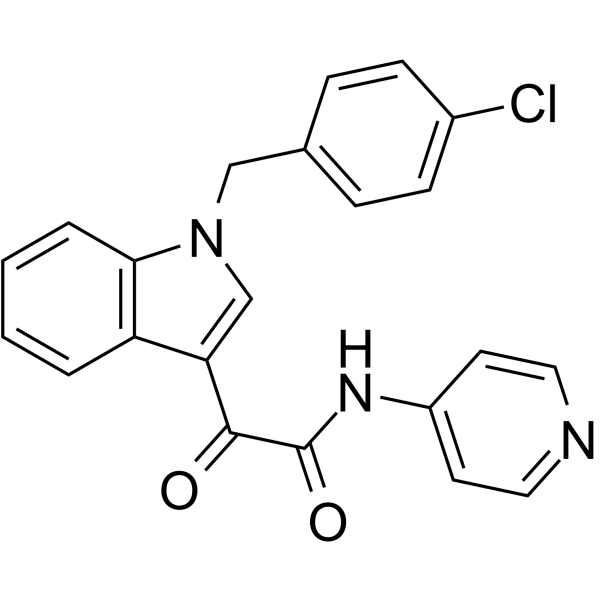
-
- HY-110347
-
|
|
Mps1
|
Cancer
|
|
Mps1-IN-1 dihydrochloride is a potent and ATP-competitive Mps1 kinase inhibitor with an IC50 of 367 nM. Mps1-IN-1 dihydrochloride inhibit Mps1 mitotic kinase activity and abrogates spindle assembly checkpoint (SAC) function. Mps1-IN-1 dihydrochloride decreases the viability of both cancer and ‘normal’ cells .
|
-
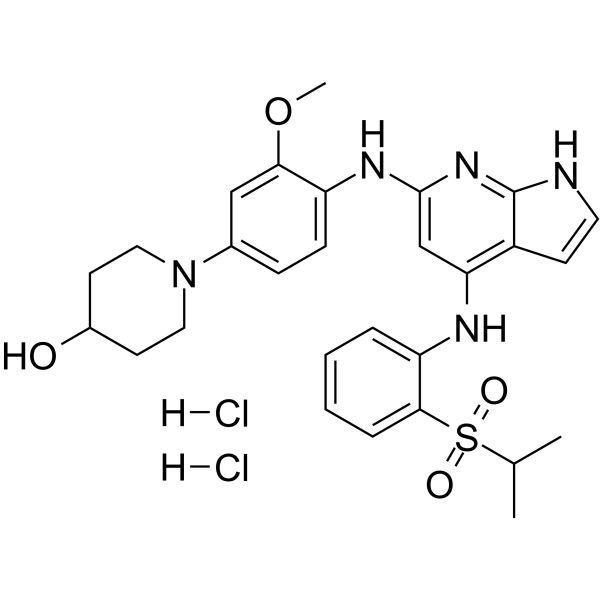
-
- HY-142931
-
|
|
ATM/ATR
|
Neurological Disease
Cancer
|
|
ATM-IN-1 is a potent inhibitor of ATM. ATM is located mainly in the nucleus and microsomes and is involved in cell cycle progression and in the cell cycle checkpoint response to DNA damage. ATM-IN-1 has the potential for the research of cancer and neurology diseases (extracted from patent WO2021139814A1, compound 3) .
|
-
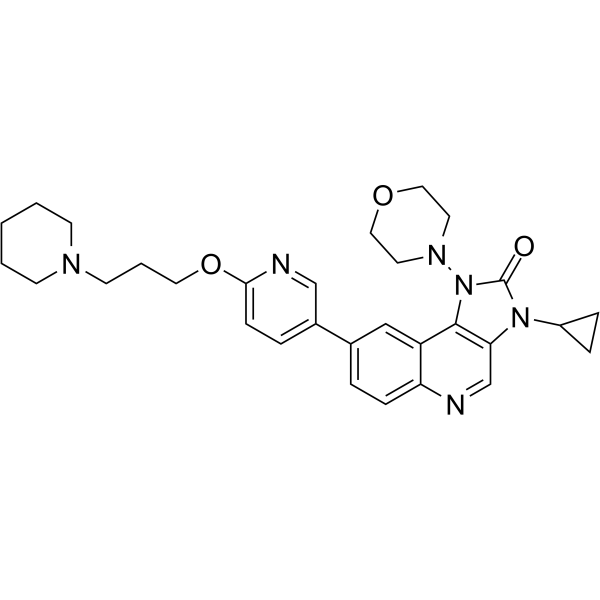
-
- HY-120635
-
|
|
PD-1/PD-L1
|
Inflammation/Immunology
Cancer
|
|
BMS-1001 is an orally active human PD-L1/PD-1 immune checkpoint inhibitor. BMS-1001 exhibits low-toxicity in cells. The IC50 value of BMS-1001 in a homogeneous time-resolved fluorescence (HTRF) binding assay is 2.25 nM .
|
-
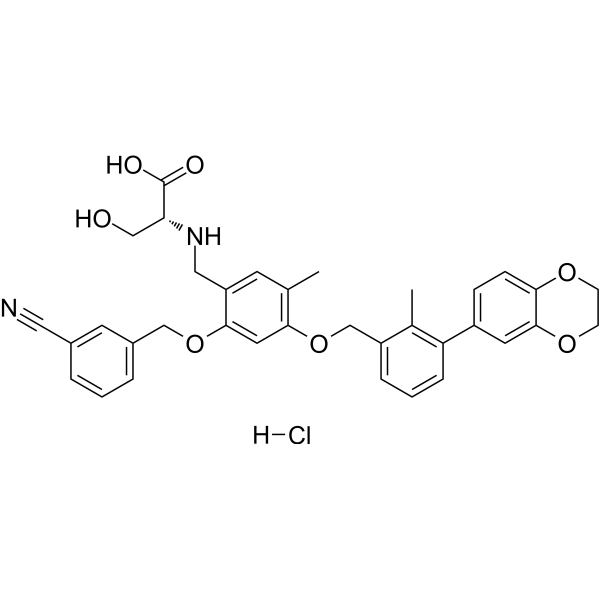
-
- HY-120647
-
|
|
PD-1/PD-L1
|
Inflammation/Immunology
Cancer
|
|
BMS-1001 is an orally active human PD-L1/PD-1 immune checkpoint inhibitor. BMS-1001 exhibits low-toxicity in cells. The IC50 value of BMS-1001 in a homogeneous time-resolved fluorescence (HTRF) binding assay is 2.25 nM .
|
-
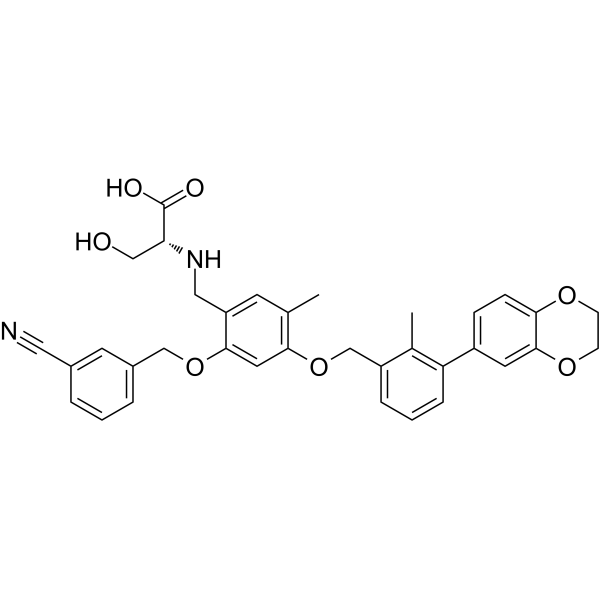
-
- HY-107407
-
|
|
Checkpoint Kinase (Chk)
CDK
PKC
Apoptosis
|
Cancer
|
|
SB-218078 is a potent, selective, ATP-competitive and cell-permeable checkpoint kinase 1 (Chk1) inhibitor that inhibits Chk1 phosphorylation of cdc25C with an IC50 of 15 nM. SB-218078 is less potently inhibits Cdc2 (IC50 of 250 nM) and PKC (IC50 of 1000 nM). SB-218078 causes apoptosis by DNA damage and cell cycle arrest .
|
-
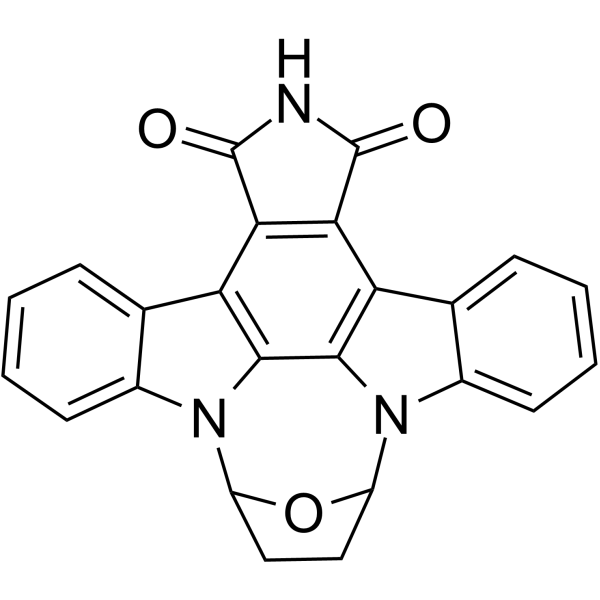
-
- HY-101093
-
CA-170
1 Publications Verification
|
PD-1/PD-L1
|
Inflammation/Immunology
Cancer
|
|
CA-170 is an orally delivered dual inhibitor of VISTA and PD-L1. CA-170 exhibits potent rescue of proliferation and effector functions of T cells inhibited by PD-L1/L2 and VISTA with selectivity over other immune checkpoint proteins as well as a broad panel of receptors and enzymes .
|
-
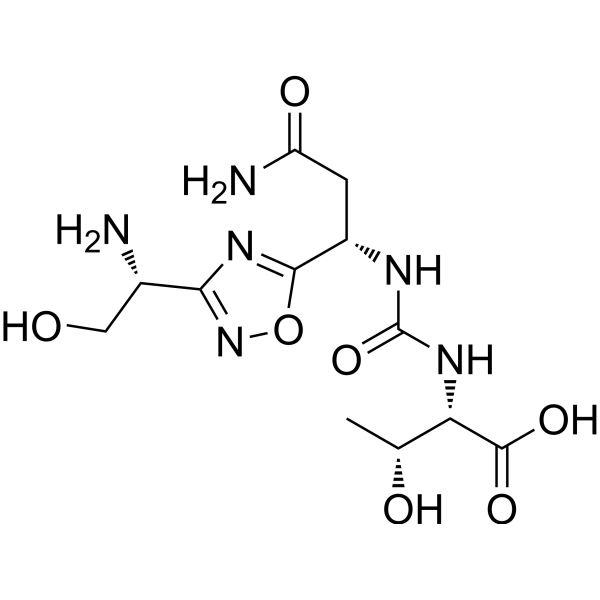
-
- HY-B0097
-
|
5-Fluorouracil 2'-deoxyriboside
|
Nucleoside Antimetabolite/Analog
DNA/RNA Synthesis
Bacterial
CMV
HSV
Apoptosis
|
Infection
Cancer
|
|
Floxuridine (5-Fluorouracil 2'-deoxyriboside) is a pyrimidine analog and known as an oncology antimetabolite. Floxuridine inhibits Poly(ADP-Ribose) polymerase and induces DNA damage by activating the ATM and ATR checkpoint signaling pathways in vitro. Floxuridine is a extreamly potent inhibitor for S. aureus infection and induces cell apoptosis . Floxuridine has antiviral effects against HSV and CMV .
|
-
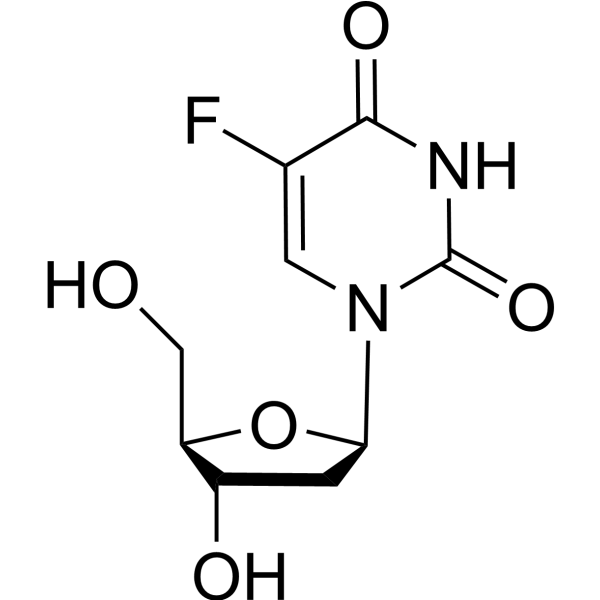
-
- HY-18174
-
|
LY2606368
|
Checkpoint Kinase (Chk)
Apoptosis
|
Cancer
|
|
Prexasertib (LY2606368) is a selective, ATP-competitive second-generation checkpoint kinase 1 (CHK1) inhibitor with a Ki of 0.9 nM and an IC50 of <1 nM. Prexasertib inhibits CHK2 (IC50=8 nM) and RSK1 (IC50=9 nM). Prexasertib causes double-stranded DNA breakage and replication catastrophe resulting in apoptosis. Prexasertib shows potent anti-tumor activity .
|
-
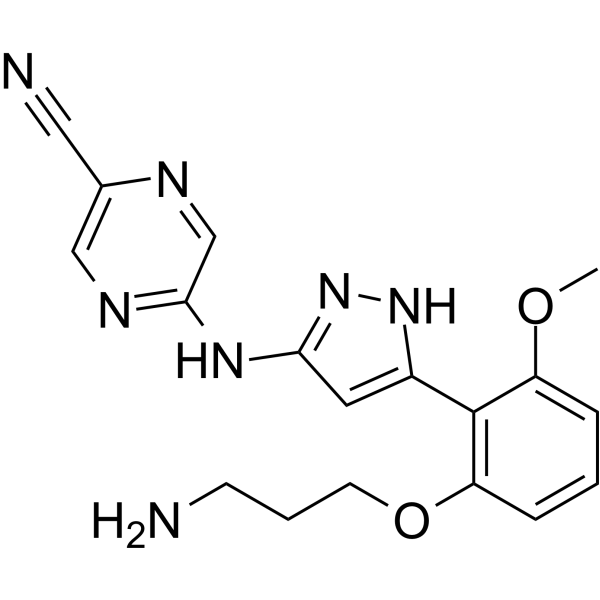
-
- HY-18174A
-
|
LY2606368 dihydrochloride
|
Checkpoint Kinase (Chk)
Apoptosis
|
Cancer
|
|
Prexasertib dihydrochloride (LY2606368 dihydrochloride) is a selective, ATP-competitive second-generation checkpoint kinase 1 (CHK1) inhibitor with a Ki of 0.9 nM and an IC50 of <1 nM. Prexasertib dihydrochloride inhibits CHK2 (IC50=8 nM) and RSK1 (IC50=9 nM). Prexasertib dihydrochloride causes double-stranded DNA breakage and replication catastrophe resulting in apoptosis. Prexasertib dihydrochloride shows potent anti-tumor activity .
|
-
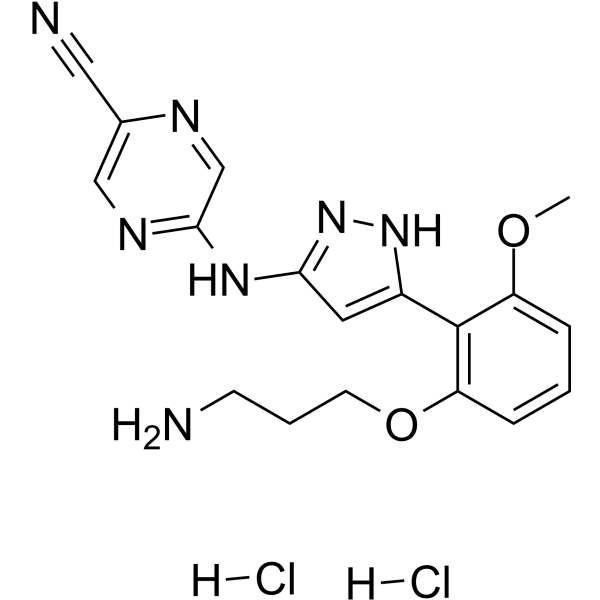
-
- HY-125018
-
|
SVT016426
|
Caspase
|
Cancer
|
|
QM31 (SVT016426), a cytoprotective agent, is a selective inhibitor of Apaf-1. QM31 inhibits the formation of the apoptosome (IC50=7.9μM), the caspase activation complex composed by Apaf-1, cytochrome c, dATP and caspase-9. QM31 exerts mitochondrioprotective functions and interferes with the intra-S-phase DNA damage checkpoint .
|
-
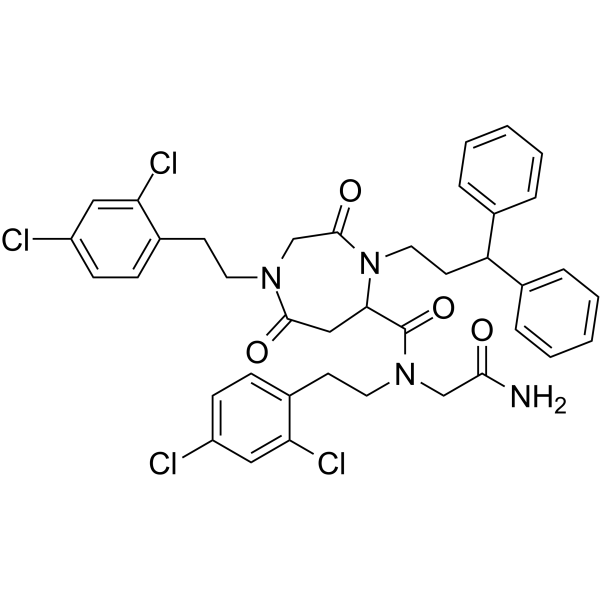
-
- HY-18174B
-
|
LY2606368 Mesylate Hydrate; LY2940930
|
Checkpoint Kinase (Chk)
Apoptosis
|
Cancer
|
|
Prexasertib Mesylate Hydrate (LY2606368 Mesylate Hydrate) is a selective, ATP-competitive second-generation checkpoint kinase 1 (CHK1) inhibitor with a Ki of 0.9 nM and an IC50 of <1 nM. Prexasertib Mesylate Hydrate inhibits CHK2 (IC50=8 nM) and RSK1 (IC50=9 nM). Prexasertib Mesylate Hydrate causes double-stranded DNA breakage and replication catastrophe resulting in apoptosis. Prexasertib Mesylate Hydrate shows potent anti-tumor activity .
|
-
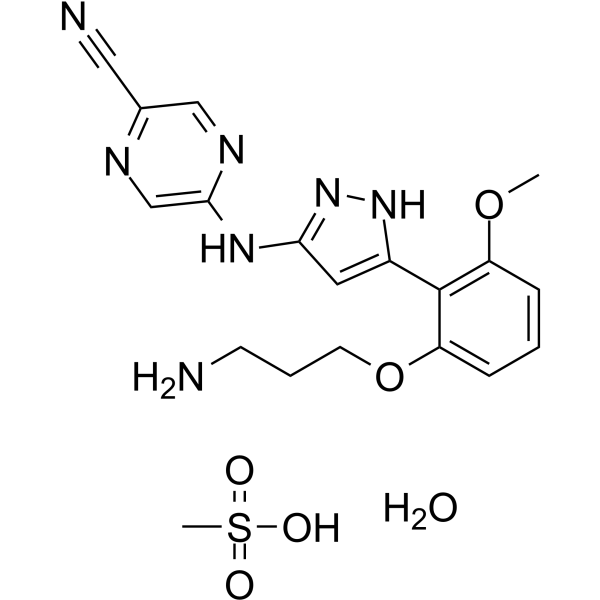
-
- HY-18174C
-
|
LY2606368 mesylate
|
Checkpoint Kinase (Chk)
DNA/RNA Synthesis
Apoptosis
|
Cancer
|
|
Prexasertib mesylate (LY2606368 mesylate) is a selective, ATP-competitive second-generation checkpoint kinase 1 (CHK1) inhibitor with a Ki of 0.9 nM and an IC50 of <1 nM. Prexasertib mesylate inhibits CHK2 (IC50=8 nM) and RSK1 (IC50=9 nM). Prexasertib mesylate causes double-stranded DNA breakage and replication catastrophe resulting in apoptosis. Prexasertib mesylate shows potent anti-tumor activity .
|
-
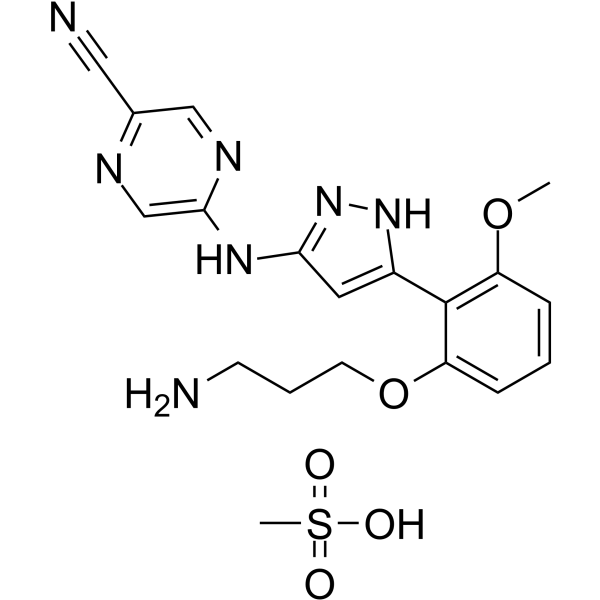
-
- HY-114842
-
|
|
Others
|
Cancer
|
|
TDRL-551 is a potent replication protein A (RPA) inhibitor (IC50=18 µM). TDRL-551 inhibits RPA-DNA interaction and increases the efficacy of Platinum (Pt)-based chemotherapy in lung and ovarian cancer. RPA plays essential roles in both nucleotide excision repair (NER) and homologous recombination (HR), along with its role in DNA replication and DNA damage checkpoint activation .
|
-
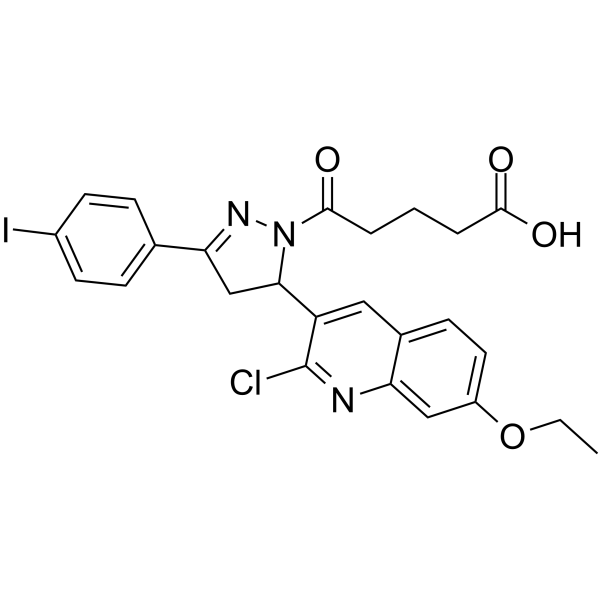
-
- HY-160691
-
|
|
Others
|
Others
|
|
GW814408X is a kinase chemical genome group (KCGS) compound that inhibits the AURKC kinase involved in cell cycle progression, checkpoint regulation, and cell division. GW814408X exhibits cell line-dependent toxicity, e.g., cytotoxic effects on HeLa cells. GW814408X acts as a protein kinase inhibitor across ATP-dependent and -independent luciferases with potential implications for Fluc reporter assays .
|
-
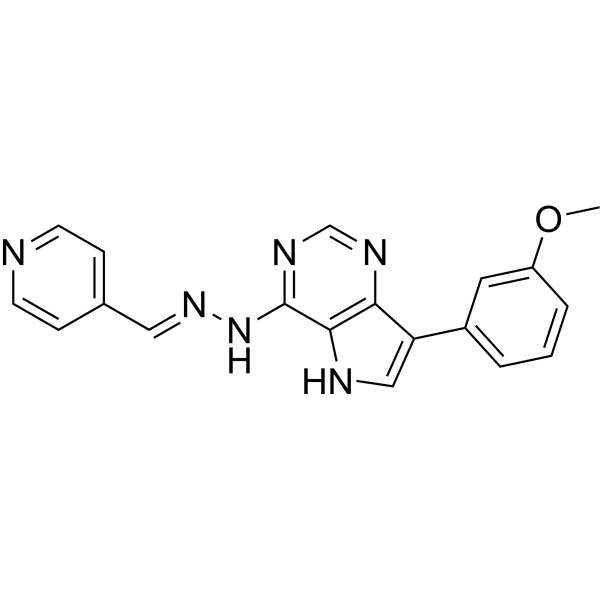
-
- HY-19959
-
|
|
ATM/ATR
Apoptosis
|
Cancer
|
|
(Z)-Mirin is an MRN (Mre11-Rad50-Nbs1) inhibitor. (Z)-Mirin prevents MRN-dependent activation of ATM without affecting ATM protein kinase activity. (Z)-Mirin inhibits Mre11-associated exonuclease activity. (Z)-Mirin increases apoptosis, triggers a G2/M checkpoint and strongly inhibits homology-directed repair (HDR) .
|
-
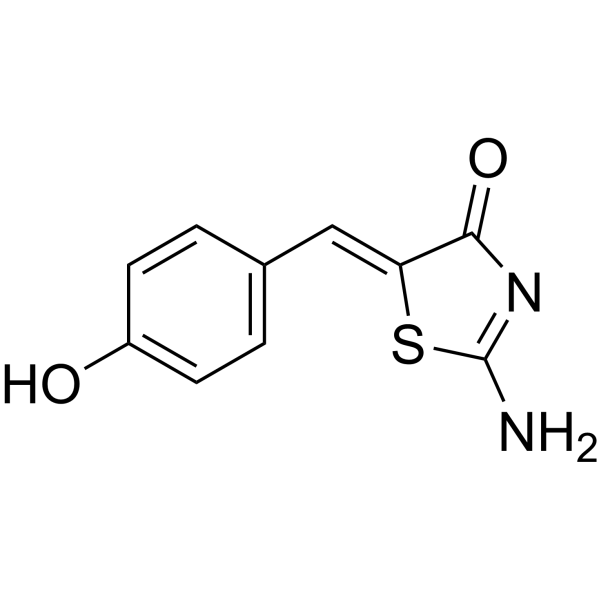
- HY-145240
-
|
|
Eukaryotic Initiation Factor (eIF)
|
Infection
Cancer
|
|
eIF4E-IN-1 is a potent inhibitor of eIF4E. eIF4E-IN-1 inhibits immunosuppression components such as immune checkpoint proteins PD-1, PD-L1, LAG3, TIM3, and/or IDO, in order to inhibit or release immune suppression in certain diseases, such as cancer and infectious disease (extracted from patent WO2021003194A1, compound Y) .
|
-
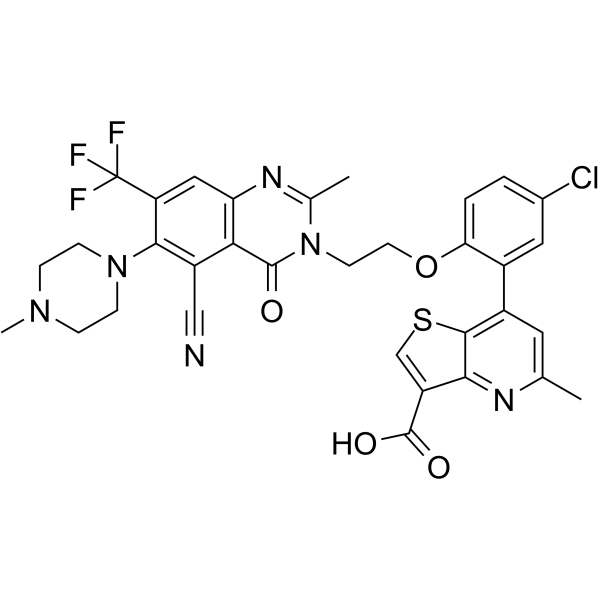
- HY-16438
-
|
|
Apoptosis
Parasite
|
Infection
Inflammation/Immunology
Cancer
|
|
RRx-001, a hypoxia-selective epigenetic agent and studied as a radio- and chem-sensitizer, triggers apoptosis and overcomes agent resistance in myeloma. RRx-001 exhibits potent anti-tumor activity with minimal toxicity . RRx-001 is a dual small molecule checkpoint inhibitor by downregulating CD47 and SIRP-α . RRx-001 is a potent inhibitor of G6PD and shows potent antimalarial activity .
|
-
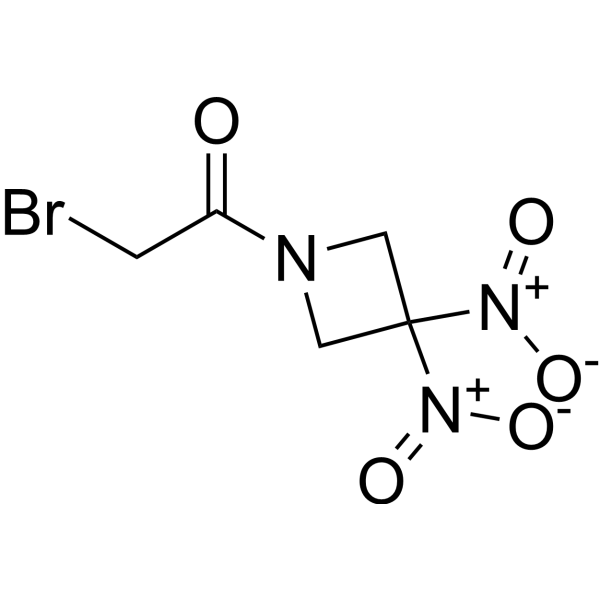
- HY-18174E
-
|
LY2606368 dimesylate
|
Checkpoint Kinase (Chk)
Apoptosis
|
Cancer
|
|
Prexasertib dimesylate (LY2606368 dimesylate) is a selective, ATP-competitive second-generation checkpoint kinase 1 (CHK1) inhibitor with a Ki of 0.9 nM and an IC50 of <1 nM. Prexasertib dimesylate inhibits CHK2 (IC50=8 nM) and RSK1 (IC50=9 nM). Prexasertib dimesylate causes double-stranded DNA breakage and replication catastrophe resulting in apoptosis. Prexasertib dimesylate shows potent anti-tumor activity .
|
-
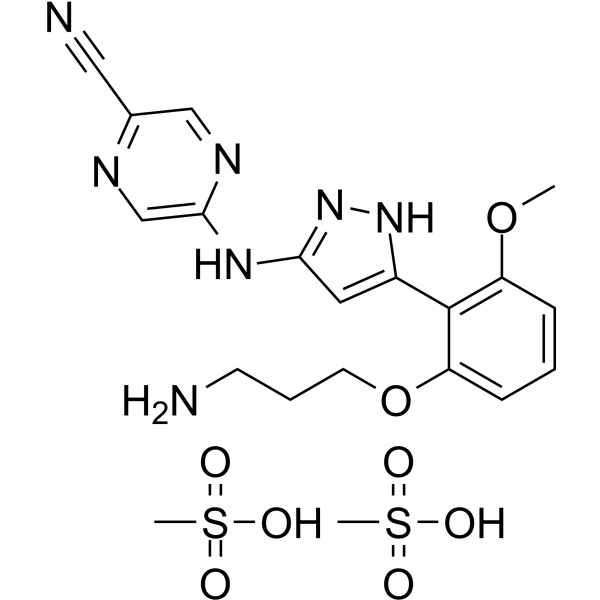
- HY-112477
-
|
|
Checkpoint Kinase (Chk)
|
Cancer
|
|
Chk2-IN-1 (compound 1) is a potent and selective inhibitor of checkpoint kinase 2 (Chk2), with IC50s of 13.5 nM and 220.4 nM for Chk2 and Chk1, respectively. Chk2-IN-1 can elicit a strong ataxia telangiectasia mutated (ATM)-dependent Chk2-mediated radioprotection effect .
|
-
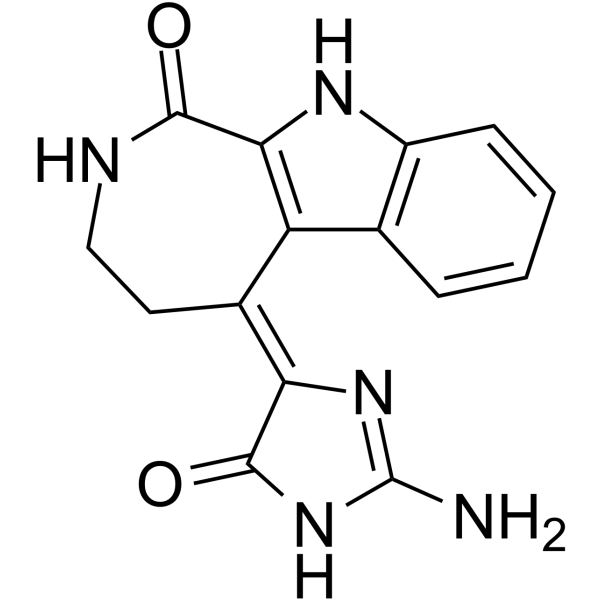
- HY-148305
-
|
|
PD-1/PD-L1
|
Cancer
|
|
PD-1/PD-L1-IN-28 (compound 3) is an immune checkpoint inhibitor of PD-1/PD-L1 signaling pathway (IC50=0.744 µM). PD-1/PD-L1-IN-28 shows good research potential in tumor immunity .
|
-
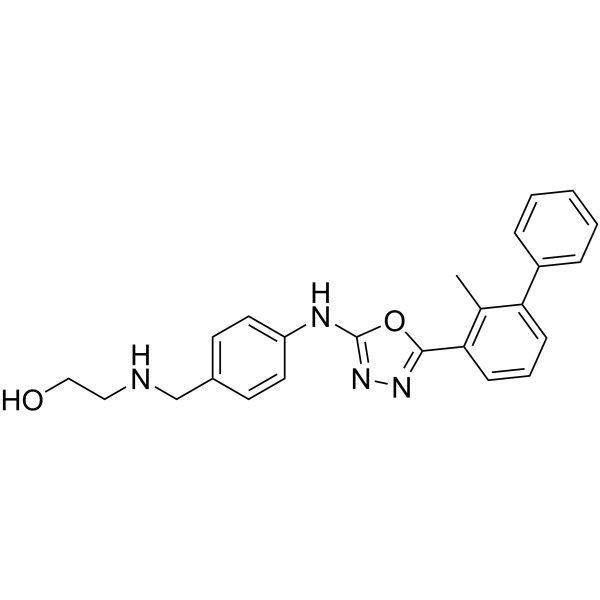
- HY-15883
-
|
|
Checkpoint Kinase (Chk)
Apoptosis
|
Cancer
|
|
GNE-900 is a an ATP-competitive, selective, and orally active ChK1 inhibitor with IC50s of 0.0011, 1.5 µM for ChKl, ChK2, respectively. GNE-900 abrogates the G2-M checkpoint, enhances DNA damage, and induces Apoptosis. gemcitabine (HY-17026) and GNE-900 administration shows anti-tumor activity .
|
-
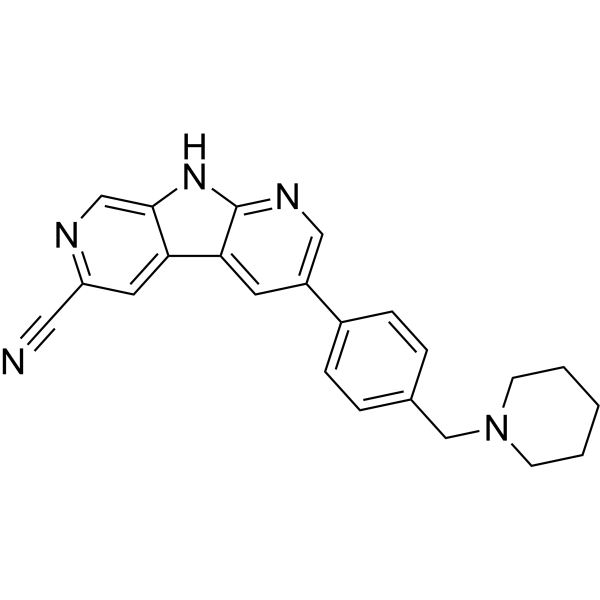
- HY-155675
-
|
|
Others
|
Cancer
|
|
TPPC, a porphyrin cholesterol conjugate, can render cancer cells more sensitive to ICIs. TPPC can enhance photodynamic immunotherapy toward lung cancer .
|
-
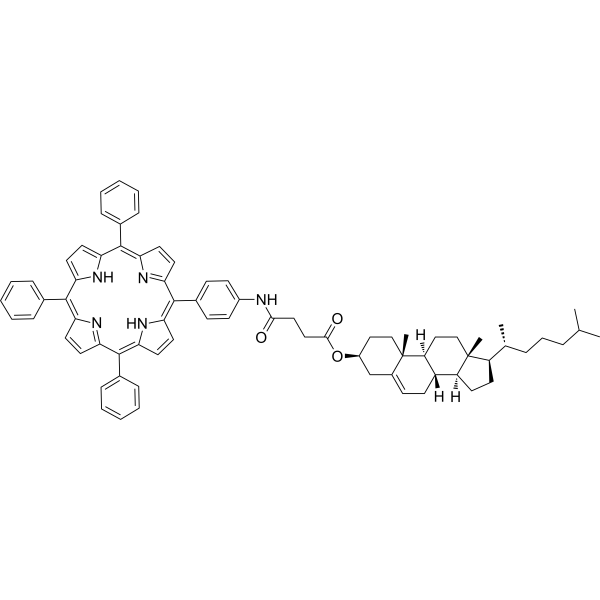
- HY-156649
-
|
CR6086
|
Prostaglandin Receptor
|
Endocrinology
|
|
Vorbipiprant (CR6086) is an EP4 receptor antagonist, serving as a targeted immunomodulator. Thus, Vorbipiprant is also a potential immune checkpoint inhibitor, to turn cold tumors into hot tumors. Vorbipiprant also antagonizes PGE2-stimulated cAMP production (IC50=22 nM). Vorbipiprant exhibit striking DMARD effects in rodents, and anti-inflammatory activity to inhibt immune-mediated inflammatory diseases .
|
-
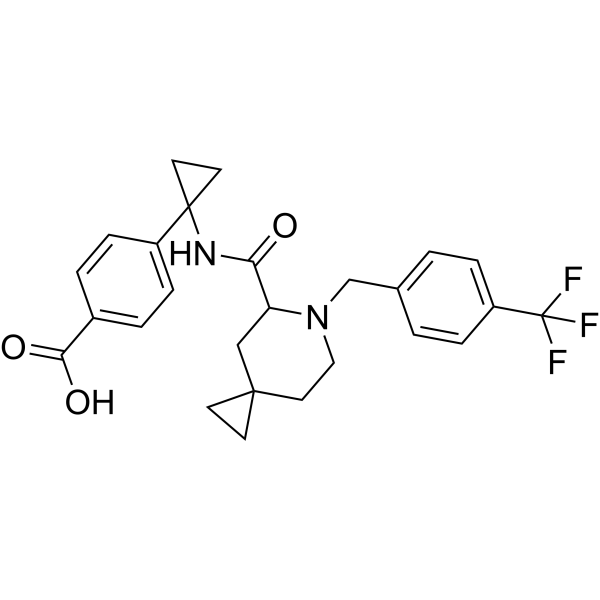
- HY-145239
-
|
|
PD-1/PD-L1
|
Cancer
|
|
PD-1/PD-L1-IN-13 (Compound 43) is a potent immune checkpoint PD-1/PD-L1 inhibitor with an IC50 value of 10.2 nM. PD-1/PD-L1-IN-13 promots CD8 + T cell activation and delays the tumor growth in the Hepa1-6 syngeneic mouse model .
|
-
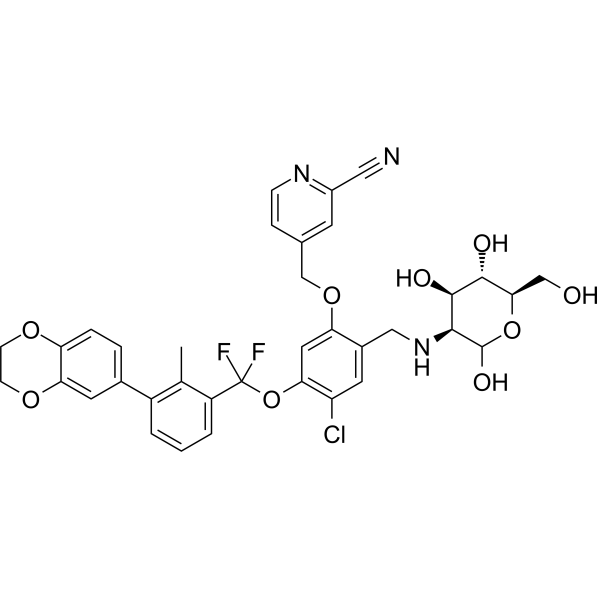
- HY-135960
-
|
|
FGFR
Apoptosis
|
Cancer
|
|
BO-264 is a highly potent and orally active transforming acidic coiled-coil 3 (TACC3) inhibitor with an IC50 of 188 nM and a Kd of 1.5 nM. BO-264 specifically blocks the function of FGFR3-TACC3 fusion protein. BO-264 induces spindle assembly checkpoint (SAC)-dependent mitotic arrest, DNA damage and apoptosis. BO-264 has broad-spectrum antitumor activity .
|
-
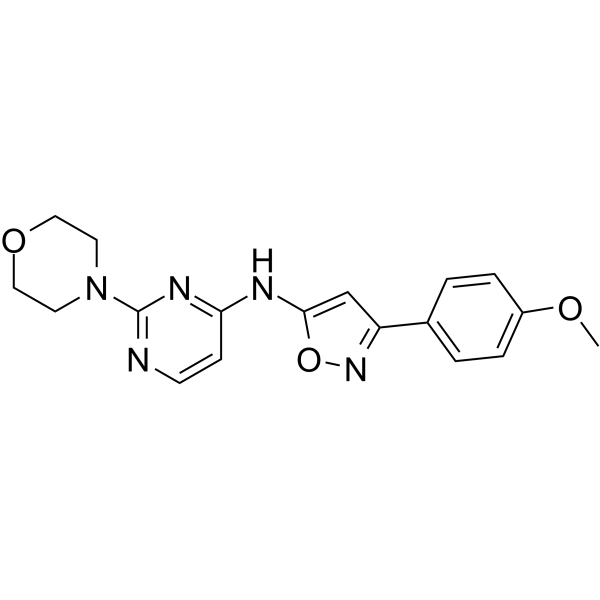
- HY-146792
-
|
|
Polo-like Kinase (PLK)
|
Cancer
|
|
PLK1-IN-4 is a potent and selective PLK1 inhibitor with IC50 < 0.508 nM. PLK1-IN-4 has broad antiproliferative activity against a variety of cancer cell lines. PLK1-IN-4 induces mitotic arrest at the G2/M phase checkpoint, leading to cancer cell apoptosis. PLK1-IN-4 can be used for researching hepatocellular carcinoma .
|
-
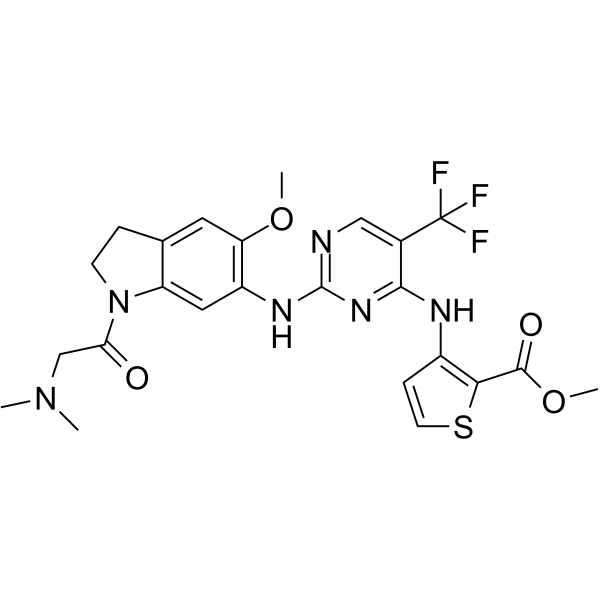
- HY-141431
-
|
|
E3 Ligase Ligand-Linker Conjugates
|
Inflammation/Immunology
Cancer
|
|
Cbl-b-IN-2 (Example 8) is an orally bioavailable compound, can inhibit the E3 enzyme Casitas B-lineage lymphoma proto-oncogene-b (Cbl-b) in the ubiquitin proteasome pathway. Cbl-b-IN-2 can be used to modulate the immune system and diseases amenable to immune system modulation. Cbl-b-IN-2 (Example 8) also may be administered to an individual with cancer, either alone or as part of a combination, with one or more of an immune checkpoint inhibitor, an anti-neoplastic agent, and radiation agent .
|
-
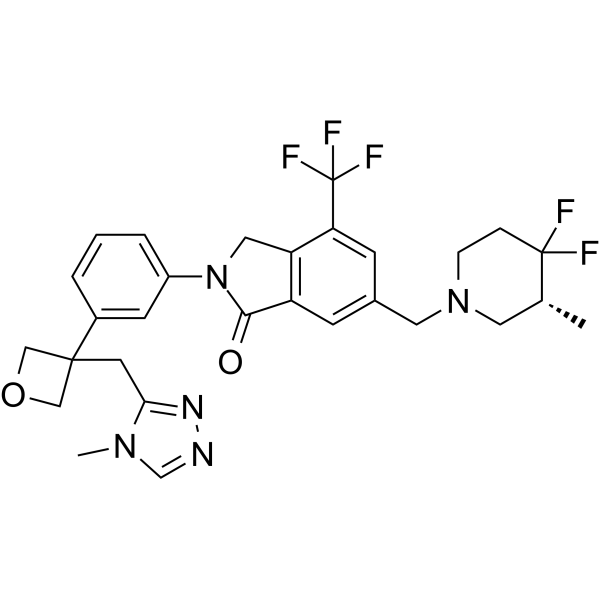
- HY-117102
-
|
|
Aryl Hydrocarbon Receptor
Checkpoint Kinase (Chk)
|
Cancer
|
|
ANI-7 is an activator of aryl hydrocarbon receptor (AhR) pathway. ANI-7 inhibits the growth of multiple cancer cells, and potently and selectively inhibits the growth of MCF-7 breast cancer cells with a GI50 of 0.56 μM. ANI-7 induces CYP1-metabolizing mono-oxygenases by activating AhR pathway, and also induces DNA damage, checkpoint Kinase 2 (Chk2) activation, S-phase cell cycle arrest, and cell death in sensitive breast cancer cell lines .
|
-
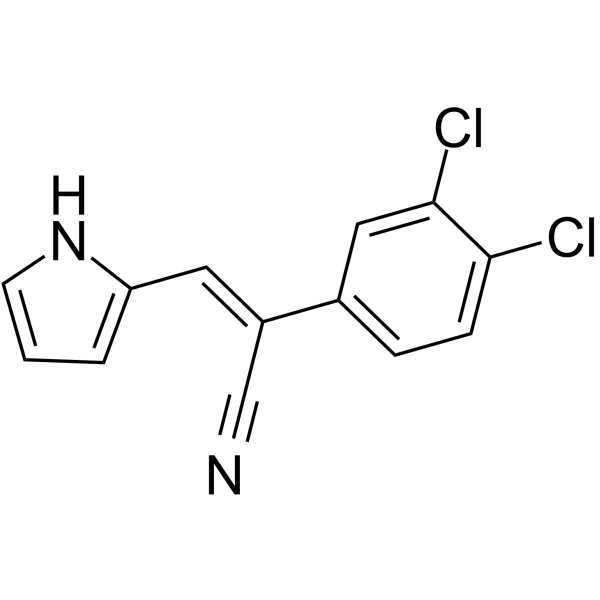
- HY-117693
-
Mirin
1 Publications Verification
|
ATM/ATR
|
Cancer
|
|
Mirin is a potent Mre11-Rad50-Nbs1 (MRN) complex inhibitor. Mirin prevents MRN-dependent activation of ATM (IC50=12 μM) without affecting ATM protein kinase activity, and it inhibits Mre11-associated exonuclease activity. Mirin abolishes the G2/M checkpoint and homology-dependent repair in mammalian cells. Mirin prevents ATM activation in response to DNA double-strand breaks (DSBs) and blocks homology-directed repair (HDR) in mammalian cells .
|
-
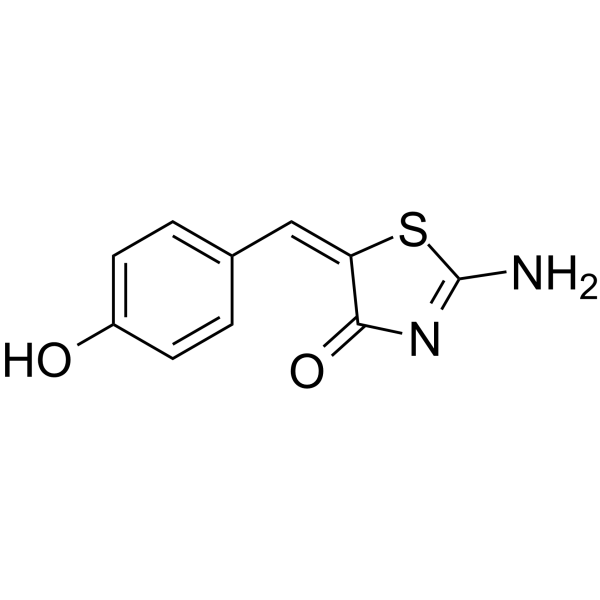
- HY-131386A
-
|
|
Target Protein Ligand-Linker Conjugates
|
Cancer
|
|
BMS-1166-N-piperidine-CO-N-piperazine dihydrochloride incorporates a ligand for PD-1/PD-L1 immune checkpoint, and a PROTAC linker. BMS-1166-N-piperidine-CO-N-piperazine dihydrochloride can be used in the synthesis of PROTAC PD-1/PD-L1 degrader-1 (HY-131183). PROTAC PD-1/PD-L1 degrader-1 inhibits PD-1/PD-L1 interaction with an IC50 of 39.2 nM .
|
-
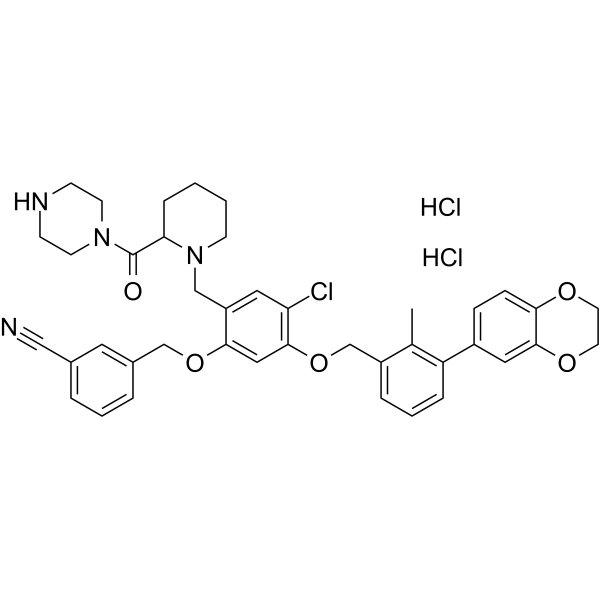
- HY-131386
-
|
|
Target Protein Ligand-Linker Conjugates
|
Cancer
|
|
BMS-1166-N-piperidine-CO-N-piperazine incorporates a ligand for PD-1/PD-L1 immune checkpoint, and a PROTAC linker. BMS-1166-N-piperidine-CO-N-piperazine can be used in the synthesis of PROTAC PD-1/PD-L1 degrader-1 (HY-131183). PROTAC PD-1/PD-L1 degrader-1 inhibits PD-1/PD-L1 interaction with an IC50 of 39.2 nM .
|
-
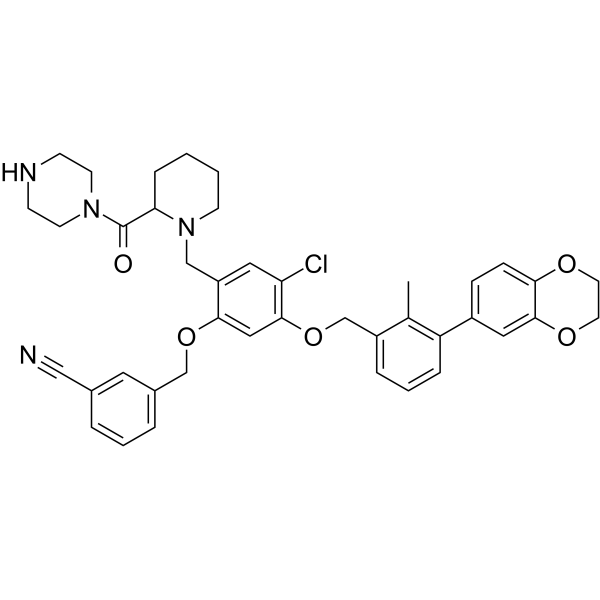
- HY-152293
-
|
|
VEGFR
ERK
|
Cancer
|
|
EVT801 is an orally active and selective inhibitor of VEGFR-3 (IC50=11 nM), which has antitumor effects. EVT801 inhibits not only VEGF-C-induced human endothelial cell proliferation, but also tumor (lymphatic) angiogenesis in tumor mouse models. EVT801 can reduce tumor hypoxia, immunosuppressive cytokines (CCL4, CCL5) and myeloid derived suppressor cells (MDSC) production. EVT801 has synergistic effect with immune checkpoint therapy (ICT), which improves ICT response rate and has better inhibitory effect on cancer mouse models . EVT801 is a click chemistry reagent, it contains an Alkyne group and can undergo copper-catalyzed azide-alkyne cycloaddition (CuAAc) with molecules containing Azide groups.
|
-
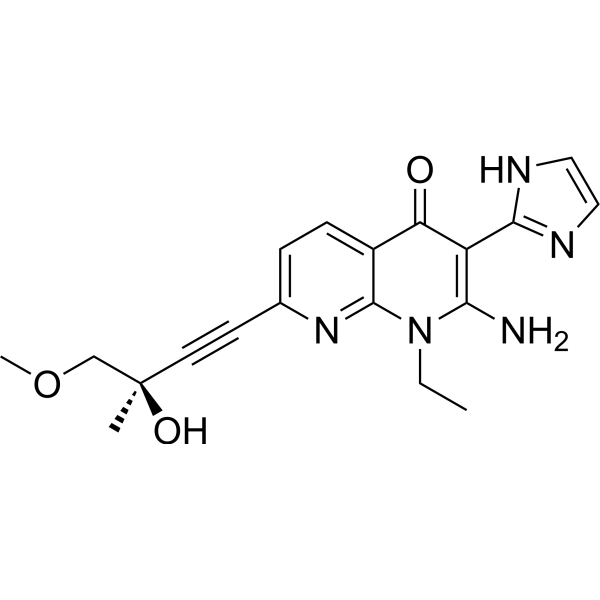
- HY-131187
-
|
|
Ligands for Target Protein for PROTAC
|
Cancer
|
|
BMS-1166-N-piperidine-COOH, the BMS-1166-based moiety, binds to E3 ligase ligand via a linker to form PROTAC PD-1/PD-L1 degrader-1 (HY-131183) to degrade PD-1/PD-L1 . BMS-1166 is a potent PD-1/PD-L1 interaction inhibitor with an IC50 of 1.4 nM. BMS-1166 antagonizes the inhibitory effect of PD-1/PD-L1 immune checkpoint on T cell activation .
|
-
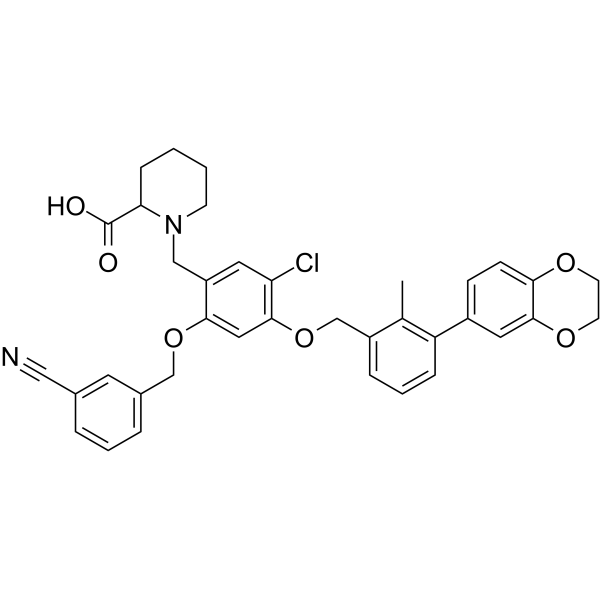
-
-
HY-L031
-
|
|
494 compounds
|
|
Immuno-Oncology is a type of immunotherapy that has the specific purpose of treating cancer. It works by stimulating our immune system to fight back. Normally, our immune system is able to destroy cancer cells in our body, however sometimes cancer cells can adapt and mutate, effectively hiding from our immune system. This is when tumors can develop and become a threat to our health. Immuno-oncology involves mobilizing lymphocytes to recognize and eliminate cancer cells using the body’s immune system. There are several immuno-oncology treatments available, including Immune cell therapy (CAR-T), monoclonal antibodies (mABs) and checkpoint inhibitors, cytokines and cancer vaccines.
MCE Small Molecule Immuno-Oncology Compound Library offers 494 bioactive tumor immunology compounds that target some important checkpoints such as PD1/PD-L1, CXCR, Sting, IDO, TLR, etc. This library is a useful tool for Immuno-oncology research.
|
-
-
HY-L184
-
|
|
632 compounds
|
|
Gastric Cancer (GC) is one of the most common malignant tumors in the world, ranking fourth in mortality rate globally. Because the early symptoms of stomach neoplasm are usually not obvious, are diagnosed with gastric cancer at terminal stage, and the relative survival rate within 5 years is very low. With the further understanding of the molecular characteristics of stomach neoplasm, many therapeutic targets for gastric cancer have been identified, and molecular targeted therapies such as CTLA-4, HER2 and immune checkpoint inhibitors have made rapid progress. Although survival rates for patients with gastric neoplasm have improved over the past few decades, the prognosis is still worrying. Therefore, there is an urgent need for new drugs to treat gastric cancer.
MCE designs a unique collection of 632 small molecules with definite or potential anti-gastric cancer activity, which is an important tool for studying the pathological mechanism of stomach neoplasm and developing drugs for stomach neoplasm.
|
| Cat. No. |
Product Name |
Target |
Research Area |
-
- HY-P99777
-
|
TTI-621
|
Inhibitory Antibodies
|
Cancer
|
|
Ontorpacept (TTI-621) is a soluble fusion protein that consists of the human SIRPα N-terminal (1-118) linked to the Fc region of human IgG1. The N-terminal (1-118)-fragment of ontorpacept is a binding domain for CD47 which is an inhibitor of phagocytosis by macrophages. Ontorpacept is a CD47-blocking checkpoint inhibitor with antitumor activity .
|
-
- HY-P99032
-
|
IPH2201
|
Checkpoint Kinase (Chk)
IFNAR
|
Inflammation/Immunology
Cancer
|
|
Monalizumab (IPH2201) is an immune checkpoint inhibitor targeting Natural Killer Group 2A (NKG2A). Monalizumab, a humanized anti-NKG2A blocking mAb, increases IFN-γ production, thereby promoting NK cell effector functions. Monalizumab can be used for the research of head and neck squamous cell carcinoma (HNSCC) .
|
-
- HY-P99895
-
|
|
PD-1/PD-L1
|
Inflammation/Immunology
Cancer
|
|
Rulonilimab is a human IgG1 monoclonal antibody against PD-1 that targets, binds and inhibits PD-1 and its downstream signalling pathways with potential immune checkpoint inhibition and anti-tumour activity .
|
-
- HY-P99166
-
|
|
PD-1/PD-L1
CTLA-4
|
Inflammation/Immunology
|
|
Vudalimab is a potent dual PD-1 and CTLA-4 inhibitor as a fully humanized bispecific monoclonal antibody. Vudalimab targets immune checkpoint receptors PD-1 and CTLA-4 and promotes tumor-selective T-cell activation .
|
-
- HY-P9986
-
|
|
Inhibitory Antibodies
|
Inflammation/Immunology
Cancer
|
|
Tiragolumab is an immune checkpoint inhibitor binding to T-cell immunoglobulin and ITIM domain (TIGIT). Tiragolumab, alone or in combination with the PD-L1 inhibitor Atezolizumab (HY-P9904), may be effective against multiple solid malignancies-most notably non-small cell lung cancer (NSCLC) .
|
-
- HY-P990031
-
|
M-6223
|
Inhibitory Antibodies
|
Inflammation/Immunology
Cancer
|
|
Dargistotug (M-6223) is a fully human IgG1 monoclonal antibody targeting TIGIT (T cell immune receptor with Ig domain and ITIM). TIGIT is an inhibitory immune checkpoint that promotes NK cell depletion and reduces the secretion of cytokines by binding to CD155 and other antibodies. It can also directly or indirectly inhibit effector T cells and upregulate Tregs cells, thereby exerting immunosuppression. Function .
|
-
- HY-P990061
-
|
JTX 8064
|
Inhibitory Antibodies
|
Inflammation/Immunology
|
|
Polzastobart (JTX-8064) is a humanized IgG4 monoclonal antagonist antibody that selectively binds LILRB2 and prevents it from binding its ligands, classical and non-classical MHC I molecules. Polzastobart enhances pro-inflammatory cytokine production in macrophages by blocking the ability of LILRB2 to bind HLA-A/B and/or HLA-G, a marker of immunotolerance on cancer cells. Polzastobart is a macrophage immune checkpoint inhibitor .
|
| Cat. No. |
Product Name |
Category |
Target |
Chemical Structure |
| Cat. No. |
Product Name |
|
Classification |
-
- HY-116423
-
|
|
|
Alkynes
|
|
JH295 is a potent, irreversible and selective NIMA-related kinase 2 (Nek2) inhibitor with an IC50 of 770 nM. JH295 inhibits cellular Nek2 via alkylation of Cys22. JH295 is inactive against the mitotic kinases, Cdk1, Aurora B or Plk1, and does not perturb bipolar spindle assembly or the spindle assembly checkpoint . JH295 is a click chemistry reagent, it contains an Alkyne group and can undergo copper-catalyzed azide-alkyne cycloaddition (CuAAc) with molecules containing Azide groups.
|
-
- HY-116423A
-
|
|
|
Alkynes
|
|
JH295 hydrate is a potent, irreversible and selective NIMA-related kinase 2 (Nek2) inhibitor with an IC50 of 770 nM. JH295 hydrate inhibits cellular Nek2 via alkylation of Cys22. JH295 hydrate is inactive against the mitotic kinases, Cdk1, Aurora B or Plk1, and does not perturb bipolar spindle assembly or the spindle assembly checkpoint . JH295 (hydrate) is a click chemistry reagent, it contains an Alkyne group and can undergo copper-catalyzed azide-alkyne cycloaddition (CuAAc) with molecules containing Azide groups.
|
Your information is safe with us. * Required Fields.
Inquiry Information
- Product Name:
- Cat. No.:
- Quantity:
- MCE Japan Authorized Agent:












































































